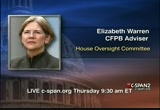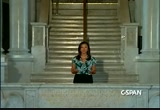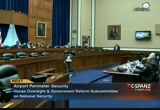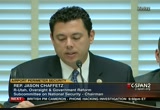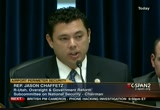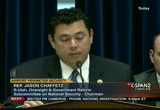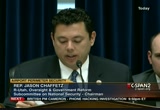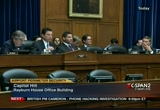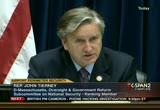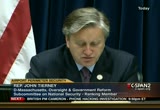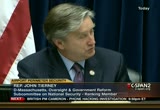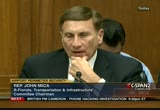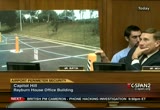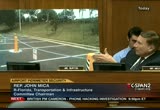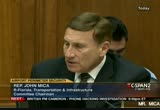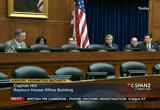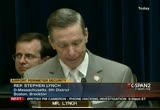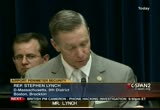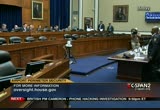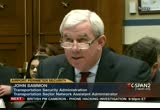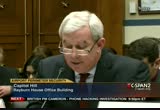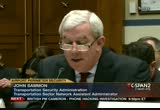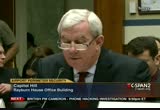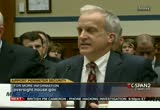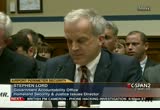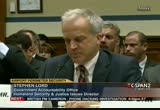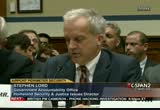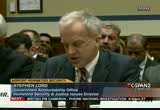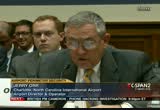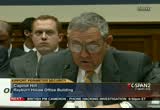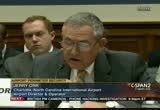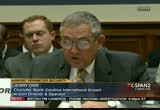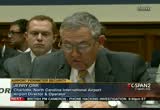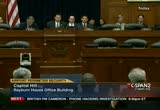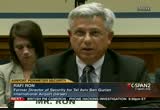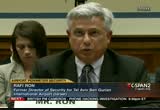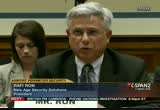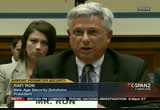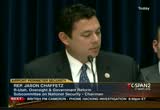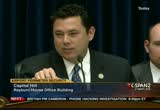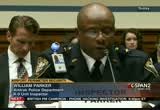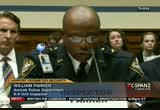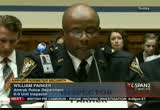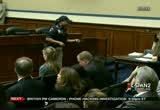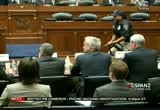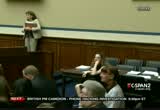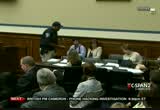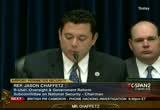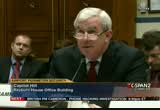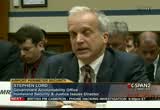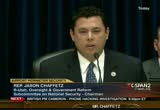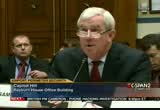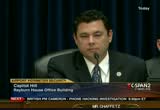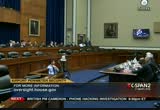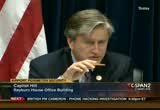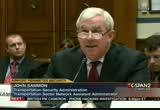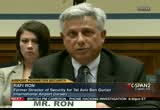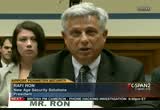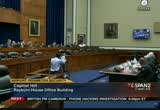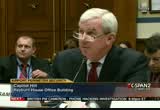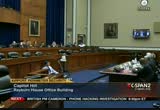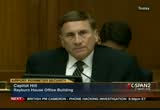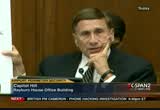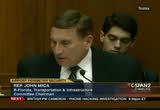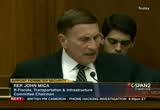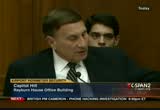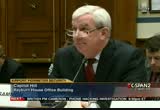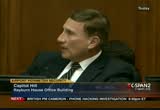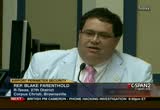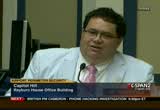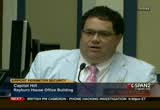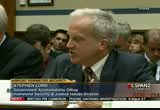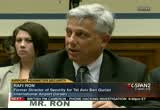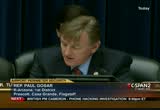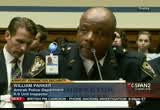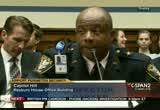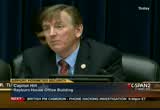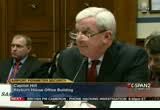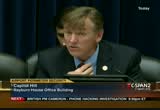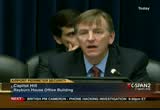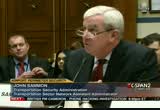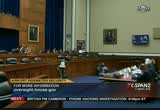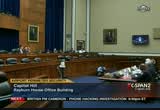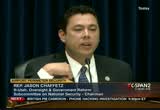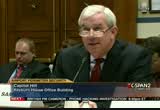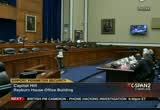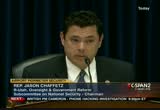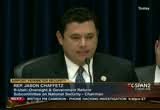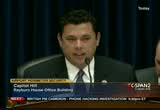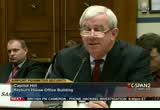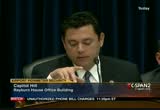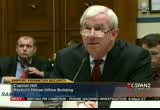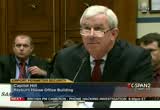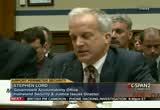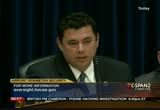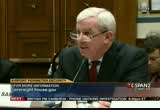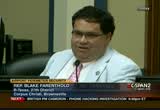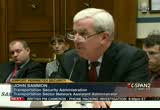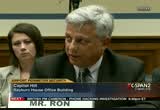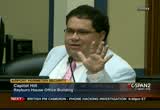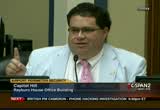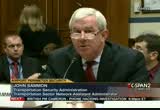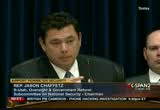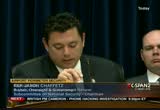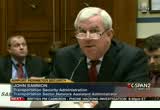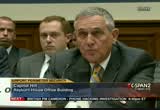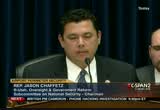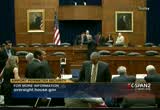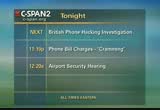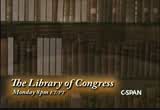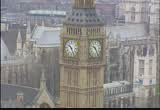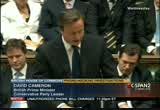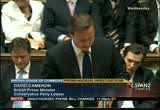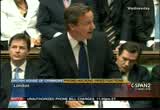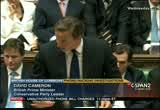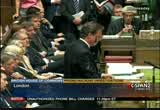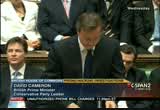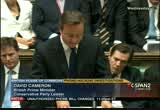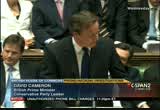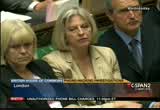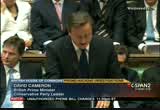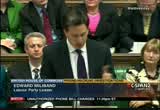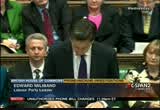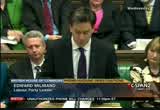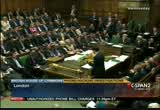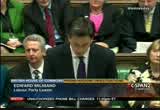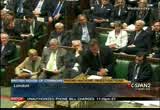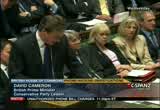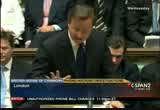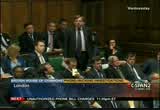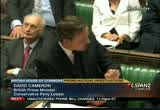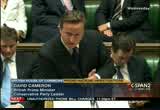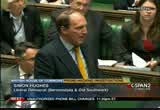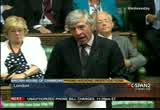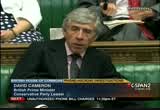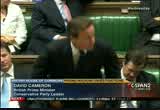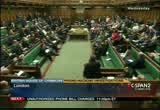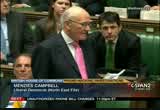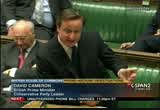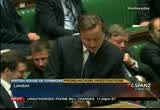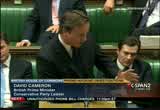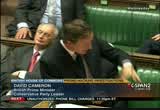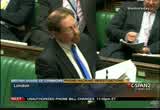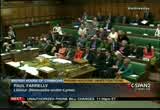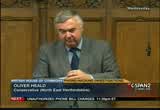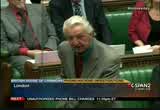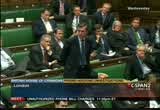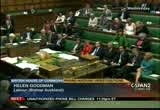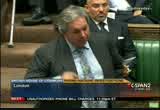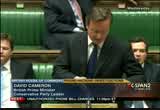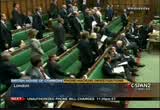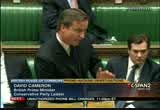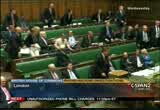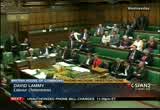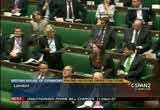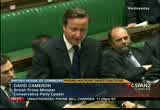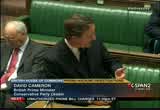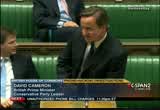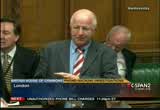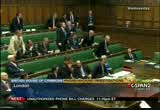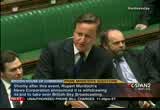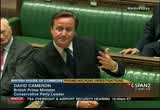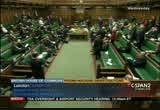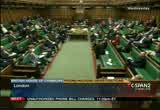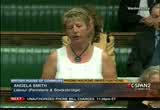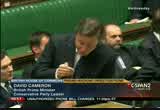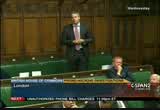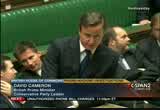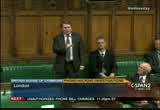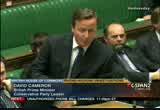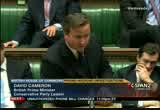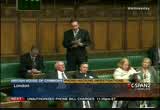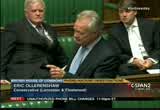tv Tonight From Washington CSPAN July 13, 2011 8:00pm-11:00pm EDT
8:01 pm
in c-span's original documentary. the library of congress. airing this monday night. we will tour the iconic jefferson building including the great hall and the reading room, we will show treasures found in the rare books and special collections including the original thomas jefferson library and presidential papers from george washington to calvin coolidge, and learn how the library is using technology to discover hidden secrets in their collection and to preserve its holdings for future generations. join us for the library of congress this monday night at eight eastern and pacific on c-span. and to read every book in this library, one per day, it would take over 60,000 years. the chairman of the house oversight subcommittee on
8:02 pm
national security says that despite spending billions to enhance security, airports are still vulnerable to terrorist attacks. those comments came during a hearing on securing airports parameters. witnesses include the former security director of the tel aviv international airport in israel. this is a little less than two hours. >> good morning. the committee will come to order. i appreciate you all been here for this oversight hearing part number to regarding the tsa airport perimeter screenings. i'd like to welcome a ranking member tierney and members of the subcommittee and the audience who are here participating with us and those of you that are watching on television to meet today's proceedings in the second mysteries of hearings designed to evaluate the status of u.s. airport security and the policies employed by the department of homeland security. there are a number of concerns that have been highlighted and drawn-out here today.
8:03 pm
first and foremost, we have learned that there have been 25,000 security breaches at u.s. airports since november, 2001, and i do appreciate the tsa tracking and providing that data but obviously those are the ones we know about. and the deep concern is about the ones we don't know about and the creativity in the things that can happen in the future? we also have deeply concerns about the tsa failing to conduct right honorable the assessments to identify gaps and perimeter screenings. 2009 the gao concluded there were 87% of these airports have not had these threat assessments done and that number really has not changed. i also like the national strategy to secure commercial airports with access controls. this again coming from the gao report that says the nation's have not been guided by the unifying national strategy, and of quote. also concerned about more than
8:04 pm
900,000, 900,000 security badges at the 457 airports. and the dangers that can lead to and the challenges that presents. we are also concerned what is happening at some of the nation's airports, for instance at jfk investigative reports show, quote, a quarter mile of the perimeter is down leaving a gaping hole in security along a main runway. end of quote. the project is four years behind schedule. also concerned about what happened at dallas' love field the defense has been breached or damaged at least 20 times in less than five years in fact air traffic control tapes show pilots on the ground were unsure what to do when a pickup truck crashed and driven to a tarmac august 19th, 2010. one of the pilots inquired what is the protocol for something like this? if he's coming at us, can we move? your report responded just hold position, and of quote. we are also concerned what's happening at l.a.x. and 8 miles of fence built in stages over
8:05 pm
the past decade and yet no one consistent standard has happened. we have spent nearly -- we will have spent nearly $500 million on the ai team machines, call them the whole body imaging machines by the time we get to the year 2013. and yet these machines have gaps in the security that don't work. i happen to believe there's a better and smarter way to do this that is more secure, less invasive, and we are going to hear testimony today talking about the canine units and what they are able to do and i look forward to hearing that a semi. we are also concerned that these machines are a whole body imaging machines will not find some of the weapons that were attempted to be used on december, in the december 2009 incident. and the list goes on. tsa spent millions of dollars on the technology that hasn't worked and remember the 207 puffer machines after spending 30 million having those employed those were put back on the
8:06 pm
shelf. the challenge before us is great. it's real. we have to deal with that threat and security threat to the nation. it's not going to go away. there is no end to the creativity of terrorists and wildlife her press recounts say that let's remember the 25,000 security breaches 1% or less than 1% unfortunately we have to be right all the time terrorists only have to get lucky ones. a lot of what we've been participating here and my personal opinion has been security theater and is not true lead on the job to secure the airports to the degree that we need to and i think one of the personal challenges we have is a nation is how we become more secure, and yet listened these if we don't get up every personal security in the name of security and we have to find that proper balance is a difficult one knowing the threat is real. i look forward to this hearing today. we are going to also -- rather than while exxon i would like to
8:07 pm
hear from the panel but at this time recognize the ranking member of this subcommittee the gentleman from massachusetts mr. tierney for his opening statement. estimates before mr. chairman and the witnesses for being here as well. we understand we are going to address important issues here today, and one of them for instance is the screening passengers observation techniques or the s.p.o.t. program. our general accountability office has criticized the s.p.o.t. program saying that it lacks appropriate scientific validation. a department of homeland security has a recent study and it shows s.p.o.t. is more effective than random screening but it does acknowledge it didn't address whether behavioral analysis is actually an effective way to determine potential terrorists. they spent $750 million they are asking for another $250 million. i think it's pretty critical but weak -- without significant investment of their -- with a look and scrutinize whether this program actually is effective at identifying potential threats to security. we are also going to discuss the screening of checked baggage
8:08 pm
using the explosive detection technology. congress mandated 100% screening checked bags by the transportation security agency, but it's been slow to implement the standards and the airports across the country. in the general accountability office said despite the regulations being in effect in 2005, the detection technology requirements were put in place until 2009. turning the issue of the perimeter security, they're have been some high-profile breaches that we are all aware of, specifically we will hear today about a tragic incident that occurred just outside of the boston airport where a young man fell from a plane as opposed to the airport for landing. according to news reports, he likely gained access to the plan after breaching airport perimeter security in charlotte. this is not a unique incident unfortunately. we've also heard about a serial security breach by mr. ronald blanka who was somehow able to make it onto a plane leading-edge to -- jfk san francisco with a stolen pass. general counsel of the office also raised concerns with the
8:09 pm
perimeter security of the nation's airports. in 2009 the find that tsa failed to implement a national strategy to address the perimeter security with only a small percentage of the reports completed joint vulnerability assessments. this again raises serious questions that have to be addressed. sessions do the kozinski valley which alleges it's probably important for us to take the time to understand what security functions with the transportation security administration is not directly responsible for and one of those is there not principally responsible for the perimeter security airports that is primarily responsible and airport operators to insure the operator is to hear the appropriate security plan that meets federal standards. as a set of the last hearing on the tsa the agency has a difficult and tosk and it's our responsibility and role to provide constructive criticism with which tsa can strike the
8:10 pm
balance between security convenience and cost hopefully weighing heavily on the security aspect. i hope the hearing today can help tsa do that and i think the chairman again for bringing us together. >> thank you. the chairman of the transportation security the gym, from florida for his opening statement. >> thank you mr. chairman and for your leadership and for pursuing very important issues relating to transportation security and holding very important agency accountable having been involved in the tsa and actually picked the name for the agency and helped craft its enabling legislation and to monitor the activities closely and unfortunately become more and more concerned with the billions of dollars of our
8:11 pm
expanded from some of it just astounds me. we've created an agency this is a huge and thinking on risk-based bureaucracy. everywhere i turn i am appalled at what's taking place. i had the recent opportunity to go to the state capital tallahassee, and i left the airport to to pick up a rental car, and the airport is located on about a 16-foot embankment that is across the entire length of the airport. here's the front of the airport and the embankment 16 feet high. just to show you we are talking about airport security and
8:12 pm
parameters, how idiotic we could be an implementation of any requirement like this. but this is the parking space for rental cars and this is the 16-foot embankment. you can see up here where cars go through the entrance of the airport. now, there is a new airport administrator who wasn't familiar with all the details, but we are going to do a thorough investigation of this. this is just one instance again and on the thinking agency. i also know of any explosive device that could possibly penetrate to 16 feet except maybe a nuclear weapon. i don't know how much it costs to put these barriers here, but again, forcing the small airport, or eight tsa paid for
8:13 pm
it come and idiotic expense, not to mention the cost to the taxpayer or the airport, but then of course they would never consider the economic loss of the car rental firm or to the revenue of the airport. but every time, everywhere i turn, audrey see a disregard for the taxpayer. this is just one instance and one small community. again, just and i'm thinking agency. their budget is about 8 billion-dollar range. within on the open the paper a week or two ago and returned to washington, and i look at this ad. of course the humane society's looking for vice president of the federal affairs, and they have a little i will say it is about one sixth of the page but we have a half page ad for the
8:14 pm
deputy assistant administrator for legislative affairs in of this and other capitol hill publications, half a page only total disregard for tax payers resources could you expand money on whether it is a venture like this that the state capital court or in a capitol hill publication. i'm going to request an accounting for the expenditure of this, but let me just tell the tsa if you refuse to cooperate with my committee, the transportation committee, the infrastructure committee i have had and will continue to have the cooperation of both this subcommittee on which i serve and the full committee and the chairman here have agreed to cooperate to get this information and we will get the data with their it's this or
8:15 pm
other were activities you have refused to provide information to us on the regarding your expenditure were of your national deployment force where you can't have your people or people leave their jobs and you have to fly them and and put them up at hotels, pay their expenses and pay them a per diem. whether it is that issue or more than a dozen pending items we will get the information and investigate. we will protect the taxpayers who are paying the bulk of the expenses for this fiasco. thank you for holding this hearing. we will get to some issues and questions and a few minutes and i yield back to the estimates before. i now recognize the gentleman from massachusetts, mr. lynch if he would like an opening statement we will recognize you for five minutes. >> thank you, mr. chairman.
8:16 pm
very briefly, obviously the interest of airport perimeter security is a tremendous one for all of us. i know that we have spent enormously on the safety and security of the process these within the airports, but this is something that the security of our parameters of these airports have become much more of a concerned since the fairly recent incidents that involved my district. the young man that was apparently stood away above the aircraft recently from the new south carolina to the logan airport in boston actually was found deceased in my district in the town of mollohan in my district so i was able to see a close the tremendous concern
8:17 pm
generated by the hardship on the family who with a law enforcement as well and the concern in the aviation community, so i think it is worthwhile to spend some time to double our efforts and we believe has been neglected and i want to thank the witnesses for their willingness to come before us to help with the task to help the committee to make sure to insure we are being a thorough and not overlooking anything and as a result of this incident and others at the end of the process the american foreign public will be safer in our communities will be safer to be more secure, but is the goal for both democrats
8:18 pm
and republicans. that's our intent and i want to think the witnesses for coming before us to help with our work. i yield back. >> thank you. i would now like to introduce our panel so and they can be prepared for their opening statements. mr. john sammon as with the transportation security administration. we do appreciate you being here. mr. stephen is the director of the homeland security the government accountability office. mr. jerry orr is the aviation director at the charlotte douglas international airport. mr. rafi is the president of the new age security solutions and former director of the security televisa bulgarian airport, and it's inspector william parker is the commander of amtrak police department's k-9 unit appreciate you being here as well. pursuant to the committee rose all witnesses will be sworn in before they testify. please rise if you will and raise your right hand.
8:19 pm
>> the you solemnly swear or affirm the testimony you're about to give the committee will be the truth, the whole truth and nothing but the truth? thank you. you may be seated. let the record reflect all the witnesses answered in the affirmative. should allow time for discussion we would appreciate if you would limit your verbal testimony to five minutes or less. you're entire written statement will be entered into the record. with that we will start with mr. sammon recognized for five minutes. >> good morning sherman chaffetz, distinguished members of the subcommittee. i appreciate the opportunity to to appear before you today to discuss the transportation security administration's responsibility regarding the perimeter security at the defense commercial airports. i'd like to emphasize three points. first, every airport has an individualized security plan and the security perimeter security is an important piece.
8:20 pm
member to come airport authorities are responsible for executing the plan. three, tsa is responsible for approving the plan and inspecting airport compliance of the plan. unlike the checkpoint security, airport authority people and investments play the lead role in carrying out airport perimeter security. tsa conducts airport inspections to enhance security and mitigate risk associated with integrity, including joint the vulnerability assessments, special the emphasis inspections and the testing of access control process he said airports. tsa analyzes the result of these inspections and assessments to develop the mitigation strategies that enhance and airport security posture and to determine if any changes are required. perlmutter related airport compliance has been inspected 27,031 times over the past 16 months. every commercial airport receives an annual security
8:21 pm
assessment to include an assessment of the perimeter and access controls. earlier this year, tsa's office of security operations initiated a special emphasis assessment and special emphasis inspection of all airports evo you read in the perimeter security including financing, nondefense manmade barriers, national barriers, closed-circuit television, electronic intrusion and motion detection devices. assessments are complete for the largest airports with the smaller airports expected to be complete by september 30th 2011. the results of the inspection were collaborative improvements in also violations which may result in civil penalties. going beyond compliance, we work collaboratively with airport operators and airport associations. in that collaboration, tsa issued updated and improved security guidelines for airport construction as well as
8:22 pm
innovative measures which highlight best practices from airports of all sizes across the united states. the innovative measures effort was the first of its kind in working closely with airports across the nation on baseline and the best practices and airport perimeter, access control, frontage and other key areas. wally over 700 measures and practices from over 100 airports were assessed as part of the ground breaking initiative. because of that effort, airports now have a self assessment module and resource allocation tool. the tool in corporate tax scenario, scores in consequence scores and countermeasures success probabilities. allows imports to baseline the security programs against other airports and the measures in and about how to provide the greatest risks reductions for their money and their location. the goal is to work with the airport authorities to stay
8:23 pm
ahead of the terrorist threats while protecting passengers privacy and facilitating the efficient flow of travelers in the commerce. the airport perimeter security initiatives are one part of the comprehensive effort. i want to thank the committee for the opportunity to discuss this important issue and i am pleased to answer any questions you may have. >> thank you. we now recognize mr. lord from the government accountability office. we will recognize you for five minutes. >> thank you, mr. chairman, ranking member tierney and members of the subcommittee. thanks for inviting me here today to discuss aviation security issues. the attempted 2009 christmas day attack provides a vivid reminder of civil aviation remains an attractive to order this target and underscores the importance of today's hearing. securing the commercial aviation operations is difficult, given the hundreds of airports, thousands of daily flights with millions of passengers and pieces of checked baggage. tsa spent several billions of
8:24 pm
dollars each year to help secure the system however it remains. today i would like to discuss 3-cd leaders of the system first the reader detection program, also called s.p.o.t. come airport perimeter access controls and finally, tsa's checked baggage screening system. first, regarding the tsa behavior detection program, the dhs has taken action to validate the underlining science of the program based on the of reporting more actions are needed. as we reported in may, 2010, tsa deployed to the program on a nationwide basis with our first demonstration that was based on the valid science. according to the tsa, spot was deployed before a delegation was completed to help address potential threats such as those posed by suicide bombers to read the good news is the dhs completed an initial letitia study earlier this year and
8:25 pm
found that the program was more effective than if random screening in identifying so-called high risk passengers. however as noted in the study, the assessment was just the first step. additional resources are needed and it's going to be needed to fully validate the program. some recommendations were made in the latest dhs study mirrored those that we've made in our may 2010 report. in the summit is still an open question whether the behavior detection principles can be successfully applied on a large scale counterterrorism purposes and airport environments. i would now like to discuss some of the key findings from the 2009 report on airport perimeter security. in terms of progress, we noted dirty yes steps tsa had made including implementing the random worker screening program, expanding the requirements for the name based background checks and that developing new biometric security standards. however, we found that tsa had
8:26 pm
not yet time completed a comprehensive risk assessment as called for by dhs. they subsequently completed such an assessment in july, 2010. however, the dated assessment did not include an assessment of the so-called inside threat which tsa views as a significant threat. the risks posed by the inside threats will be included in the next update due later this year. we also recommended that tsa consider making greater use of the joint vana but the assessments. these are the key tool in the tsa tool box and are completed in conjunction with the fbi. the latest data shows that it's completed joint vulnerability assessments on about leaving about 83% of the airports on and assess. the last point is the efforts to deploy the checked baggage screening equipment.
8:27 pm
the program is one of the largest acquisition programs within the dhs to read as highlighted in the release to the representative mica yesterday, the tsa updated the explosive detection requirements for this equipment that faces challenges in meeting these requirements. the explosive detection requirements for the checked baggage machines were established in 1998 and in subsequently revised 2,005 and a 2010 to better address current threats. however, tsa's current checked baggage screening systems do not meet the 2010 requirements. some of the machines are operating at the levels established in 2005 to remain or robbery at levels established in 1998 to get the report describes some of the challenges tsa faces in procuring and deploying this very complicated technology. flexible, the dhs and the tsa in
8:28 pm
the counterintelligence safely collecting data on the expos of physical and chemical properties. the report contains six recommendations for improving the process for acquiring the sophisticated systems. the good news is that it has agreed to take action to implement all six of the recommendations. mr. chairman, other distinguished members of the committee does conclude my statement and i look forward to answering questions. thank you. >> thank you. we will now recognize mr. orr, the operator of the charlotte international airport. we appreciate you being here and you are recognized for five minutes. please turn on the -- may be moving a little bit closer to you if you could come to the microphone if you could. there would be great. thank you. >> mr. chairman and members of the subcommittee my name is jerry orr for the city of charlotte. at the charlotte airport. i have worked for 46 years on airport management and was a small business owner for 14
8:29 pm
years before that. i am here today to testify on airport perimeter security. i have been critical of the performance tsa since its inception. i'm not critical to its mission, i am critical of its measures. in my judgment, the effectiveness of tsa has compromised by the rigid attitude of arrogance and bureaucracy. in november of last year the body of a young man was discovered in milton massachusetts and was thought to have fallen from an aircraft. i learned about a possible connection to charlatan the media and therefore reached out to our federal security director. he did not want tsa to take the lead and instead recommended the government municipal police departments to set up an investigation and tsa what assist them. the available evidence could neither prove nor disprove a security breach had actually occurred at charlotte. the police in the tsa figure out
8:30 pm
a young man and have access to an aircraft came up with a reasonable assumption about what might have happened that excludes entry through a checkpoint, but the report fails to acknowledge that they could not conclusively rule out this possibility because tsa failed to preserve their surveillance of the checkpoints and some of it was lost. i'm not saying that they came through a tsa checkpoint. but i am saying is that the tsa failed to even admit the possibility in deflected attention elsewhere. this mentality serves to protect the agency at the cost of real security needs. the investigation focused national attention on the airport perimeter security and in charlotte we have 19 miles of six-foot high chain-link fence strands of barbed wire in the airport. this meets all federal requirements. we spend half a million dollars annually on maintaining the
8:31 pm
fence all from the airport project. we spend an additional $3 million on a 75 personnel with parameters security responsibilities. it is a deterrent. it says keep out. however, the final - security is the eyes and the years of the 20,000 people who work inside the fence. tsa seems to believe that airports are automatically in violation of the regulations even when they did everything they were obligated to do. and it simply didn't work. to me, that's like saying that customs and border protection itself is violating law each time an illegal alien crosses into the united states. other examples of tsa's flecha partnership. we recently asked tsa to explain their security basis and their legal authority for the direct to us to do something but tsa failed or refused to respond or
8:32 pm
even acknowledge our questions. tsa his conflicting rules and operational and regulatory capacities that are not kept separate. having an agency in charge for the rules, and planned actions and then judge their effectiveness lands itself to the possibility of abuse. i am confident that i am not the only airport operator with significant concerns about the effectiveness of tsa and adversarial relationship between airports and the very agency entrusted to help safeguard them as clearly detrimental to the goal of safety and security. so what can be done to improve our ability to focus on the needs of our nation's airports clacks congress should continue to support allowing airports to opt out of using the tsa and ensure that your receipt doesn't throw up marjorie roadblocks to discourage us from pursuing this alternative. any entity working with airports and airlines to achieve security must do just that and work with
8:33 pm
them. tsa is correct because i say so culture does not foster respect. i also believe congress should be directed be available funding for airport security from tsa directly to airports. the operators most familiar with the airport former devotees and strengths and its well equipped to make effective enhancements. safety and security are always our number one priority. there can always be more security, but the challenge is to provide better security. we need to spend money where it counts on things that matter. the path forward to the optimal security needs to be reasonable and collaborative. if airports are given the resources we need and the public will be the beneficiary. >> thank you psp become mr. orr. guilaume term welcome directors rafi and their part. you are recognized for five minutes. >> thank you, mr. chairman and
8:34 pm
members of the committee for inviting me to testify today. i would like to draw the committee's attention to the three factors i believe play a key role in many of the shortcomings in airport security. the first is the imbalance that was created shortly after 9/11 when tsa headed the overwhelming task of recruiting, training and installing the technology in airports around the country. something that has turned out to be the backbone of the tsa's operation and influence of the security at airports. at the same time, the airport facility security has received much less attention, and not
8:35 pm
only that screening of passengers and bags and the funding but it was also executed that according to the wall by the tsa while the rest of it was left for the local authorities to take care of. sunday was the wistfully short. the standards for the performance of the security task are not -- they are very clear and in many cases do not even accessed, and the point of order the issue of the perimeter security is a very good example for that because i think that traveling around the country one can easily noted that first of all there is very little consistency in our airports as
8:36 pm
far as perimeter security is concerned. second, most of our airports today are still not protected by an operating perimeter intrusion detection system. in other terms, we don't know when a breach occurs. we get to know that only when it is addressed by somebody or when we end up with a stowaway making his way to the real world and the settling of losing him his life after takeoff and obviously, this is not a good reasonable standard compost to those that we implement on the passenger and screening operation. as the prospectus that is that the area of jurisdiction is not really clear. when it comes to the security
8:37 pm
operations security facility operation at the airport, there's the local law enforcement agency or department is responsible to do that, but yet most were many who of the police departments that provide that service in airports are still implementing where rule more as a law enforcement agency rather than a security agency and there is a major difference between the two. and once again, if you look at perimeter as a reflection of this problem you can see the of role that the local police department is taking on the perimeter security in airports is minimal and is usually based on responding to calls rather than on early detection and prevention. so, i think there are two areas that still who receive much more
8:38 pm
attention. one is the role and the funding of the local authorities as far as the airport security is concerned and second, the need for standards that would create consistent high level performance that will characterize the security and airports around the country. thank you very much. >> thank you, mr. braun. a little explanation as we introduce inspector parker. it may be curious as to why we what invite somebody from the air and trap. amstrup police to be here at the hearing regarding the airport security. one of the questions that is legitimate this committee would like to explores weigel foot tsa has invested hundreds of millions in whole body imaging machines and technology goes as the pentagon come to the conclusion dogs are the single
8:39 pm
best way to find explosive devices. i would like to ask unanimous consent to introduce into the record there was a press conference by lieutenant general michael oats who says, quote, dogs are the best detectors and this -- i would point to this and i know that all americans to this magazine come airmen which is of the united states air force in the 2011 edition a full pullout says there's no technology proven more effective than the explosives and the canine and that there are questions as to our we investing enough in technology that we know how it works in the canines according to the pentagon having spent literally tens of billions of dollars. again, without waxing on too much more, we do truly appreciate inspector parker being here today and as a bit of explanation his wing to give testimony and then we are going to have a demonstration.
8:40 pm
don't let anybody in here worry, but i will let him explain how we are going to conduct this. we would ask anybody in the audience stayed put and if you have some sort of something, we are glad you are here, inspector, but we are going to do a bit of a demonstration. we just ask that you hang tight while we do this and appreciate the leeway in the committee as we do this demonstration. we will give you great leeway. >> good many mr. chairman and ranking member turney. my name is william parker and i'm the inspector commander of the amtrak police department k-9 unit and i am honored to be here today and appreciate the invitation to speak with you about what dogs can do to improve airport security and detect explosives. a trained dog is more capable, useful, reliable and effective than equipment. they do not depreciate like the material. if dogs are trained properly and if their training is consistent it will increase with experience perimeter security is of great concern to airports and the
8:41 pm
transportation administration many airports rely on surveillance and cameras to protect their perimeter. the problem as if nothing appears on the camera after the alarm goes off, you can't just assume nothing is there. someone has to respond and make sure no one is hiding from the camera. a well-trained law enforcement officer and a well-trained patrol dog can find and address the threat immediately without waiting for back up to lead on an laughter september 11th, to those in the one we use explosive dogs to airport terminals. the dogs we use for the explosives and the morning before the terminal opened and the evening when it closed lysol a surge in interest in canine capability after 9/11. as people realize dogs were effected and in crowded a fireman's they're supposed to occur screening in devotees or better in the crowds and technology. amtrak trains are randomly slipped for explosives before boarding. we keep an explosive team
8:42 pm
present at the boarding gates to provide a detection capability and immediate response. i think a dog on a jet would improve security with no inconvenience to travelers and would provide an lt did sense of security. dogs are very effective not only detecting explosives but as a deterrent in many environments when deployed properly. amtrak has many talents particularly the need to use -- the need to secure open space areas that intruders can use to come into our property. we have been able to implement some new procedures that can be used in airports. i have helped pioneer new applications of canine called vapor week. avaya per week is a trained dog smell too small for a week of explosives in the material after a person passed by the area. amtrak is working with auburn university and other agencies to develop this application and other agencies such as tsa are
8:43 pm
starting to use this can my method. in closing, i would like to reiterate my position that a good k-9 program is an excellent investment for any agency that needs to secure high traffic areas orifice of the parameters provided the program is properly funded and supported with a strong infrastructure. to this point i have brought to teams with me to give a brief demonstration. after we conclude the demo, i would be happy to answer any questions you might have. thank you again for this opportunity. what you're going to see in this, sir, is oddly explained about the vaperwake technology. the dog will be able to detect people that walk by. he's not interested and will not stop anybody staff to read you are going to see two of them from my right, your left. we will have people come through the door. the dog is pretending she said a check point. people will come in and the dog
8:44 pm
will be able to detect cocaine what something on them. -- detect who came and with something on them. we are just waiting on the crowd of people. [inaudible conversations] >> as you see the dog is not intrinsically hurting anybody. walking as you see that's a hit, that person walked by, the dog is walking, walking. and as you see this is a
8:45 pm
response the dog would give and this individual has ankle weights on that have explosives on his ankles and you can look at him physically and not see anything but he has about 5 pounds of an explosive on his ankle. can you show the committee, sir? in that is smokeless powder. a second demonstration we are going to give -- okay, you can move. second demonstration we are going to give is like a set when a person passes through an area -- [laughter] that's levi, the chocolate lab. as a person passes through you will see a person walking through the room right there, over there to your left. she's going to walk and sit down and we will have a dog, for the same area. the person already sat down to read the bob is going to come in and follow the scent and determine where she's located at.
8:46 pm
8:47 pm
[inaudible conversations] >> good girl. let's give the dogs a round of applause. [applause] a dinham i want to thank you for this opportunity and any questions you may have to use a mix before it. very impressive and going to recognize myself for five minutes as we move to the questions. and we will go from there. i want to start with mr. sammon and the gao. the gao in the reports released out today, its stated today, page 12 and 13 it says our analysis of the tsa data shows from fiscal year 2004 through july 1st, 2011, tsa conducted the joint vulnerability
8:48 pm
assessments at about 70% of the regulated airports that existed at the time thus leaving about 83% of the airports and assessed. how can that be? in september, 2009 it would say that 87% of the airports haven't been assessed, and over that time frame we've not only moved that number to 17% assessment? >> the joint vulnerability assessments are done in concert with the fbi. the garden by their extensive assessments and they're done in a limited number of locations, but every single commercial airport receives an annual security assessment. >> why are there 100% done, a joint letter ability assessments? is the goal not to get to 100%? >> tsa as complete security assessments including the perimeter of all airports every year including wheat and 27,000 inspections. >> i'm asking of the joint -- i
8:49 pm
recognize there are differences. >> there are different assessments. >> what is your goal. do you have the goal of getting to 100%, yes or no? >> of the 400 airports with the fbi every year, no to disconnect not even every year. at some point. you have looked into this. what were your findings in this particular area? >> when we first looked the number was at 13%. that was from the 2004, 2008 time frame and we asked tsa for updated analysis and the numbers have actually gone up. it's now 17%. these are the very intensive examinations focused on high-risk airports, and tsa considers them the gold standard. they obviously conduct a whole host of other activities and inspections and testings. i mean, there's quite a few things they do, but we thought this was worthwhile to single
8:50 pm
out given the significance. we do recognize difficult to quickly come and you have to get the fbi involved. >> why don't understand is given the imperative, given the knowledge and understanding that we are only as strong as the weakest link and it may be that small their part as we saw on 9/11 neither one of the major airports initially had gotten into the system and got behind the security line. why is the tsa not demanding and working towards getting to 100%? don't understand. this 457 airports. why aren't 457 airports getting this done? >> this level of assessment will be done with a limited number of airports and not all their parts will be done. they will have inspections and a complete assessment -- >> i just -- are you absolutely don't understand that. i don't understand. i think it's unacceptable. mr. orr, in your testimony you said the tsa is yet to improve airport security program, quote,
8:51 pm
i think you said we have been trying to get revisions to the approval for about a year now. can you explain that a little bit more, please? >> yes, sir. we are required to the security planning change in the security procedures, and we submitted an amendment to the local federal security director over a year go, heard nothing for six or seven months and address that comment and again lay out for a couple of months. and then our assistant security director that we have been working with disappeared and a new one appeared and in the process started all over. >> mr. sammon, do you care to respond to that? >> as i understand the request
8:52 pm
to change the security plan was in progress and was initiated about a year ago. there was a joint owner of the assessment with the fbi conducted in the fall of 2010. it's my understanding -- i don't know this personally -- tickets am i understanding the parties agree to hold off on a completing rewriting of the airport security plan until we understand the result of the vulnerability assessment and the perimeter security was not particularly flattering. and where the amendment is and rewriting it i think both parties agree -- >> it sounds like he's been waiting for a year. >> both parties agreed to wait until something he brought up last time is the joint for one of the assessment and that should be very insightful in terms of what you do with your
8:53 pm
security plan. >> mr. orr? >> we have had to joint vulnerability assessments. one in 2007 and one in 2010. at the conclusion of each one, we ask for additional information to help us understand what you're talking about here. and both cases have not received that. we submitted our plan, our amendment and we heard nothing. we checked on a couple of times and they said it was in the works. >> this is the frustration. you have no gold to get to 100% of the vulnerability assessments on the 450 of their ports you need improvement on the 14% to 17%. then we had an airport where you have done a joint former of the assessment, and you're not getting the responsiveness to read this is a collaborative effort to have got people all over across the country, you're supposed to be the expert in the middle of this. my time is expired and i now recognize mr. tierney from
8:54 pm
massachusetts. >> thank you very much. mr. lloyd, the joint folder of the assessment what's your analysis of how likely it is that 100% of the airports could undergo that particular scrutiny every year? >> we don't think would be appropriate to do every year but perhaps on a ruling basis that's what they do now. they have a target within a three year time frame they try to focus, complete the high-risk airports. it's not a matter of resources but obviously they are expensive and you need to get the cooperations. >> so there are the plans to 100% of the risk airports in that timeframe. >> the would be difficult to achieve under the current process. i would defer to mr. sammon on that. >> but your understanding is that is the plan? >> it's not the plan, it's as mr. sammon stated the current goal was not to 100%.
8:55 pm
my point is they do them on a ruling three-year basis. >> how many of the high-risk inputs would be done on the ruling basis? >> i have to get back to the operations. i would be happy to respond with the committee on that. >> would it be 50% or 25%? >> i would have to check with the fbi tuzee -- we need fbi, operations, tsa even getting the fbi resources and redo the project, off and so on and so forth. it's not tsa we don't run this by ourselves. >> when we were talking about the screening passenger observation techniques programs, can you differentiate that between the usual type of random search? >> yes, i think the witness on the panel mr. ron is on this but
8:56 pm
we are looking at mike official anomalies, the way people leaving, particularly the kind of facial movements they have as they approach the checkpoint. these spot programs are resulted in more than 2,000 since 2006. looking for people who had perhaps criminal -- other types of fraud to the door ely collect the debt they were engaged in the the science is based on the microfacial anomalies the way people look and that is what they are trained to. so it's more than random. you are looking for people with the crowd, looking for people who have in that context somewhat evident looks. as a clear about a billion and to this. three-quarters of a billion dollars and is that worth of the money? >> i think that the investment in the behavioral observation certainly makes sense because all the rest of what you're doing is very much limited to the detection of items ten years
8:57 pm
after 9/11 with the attempted attacks we had during the struggle of time to reach a conclusion we need to spend more attention and people rather than just on items, and observing the behavior is one of the basic tools that they can be used at the airport, but obviously it is only one single school in a much wider and more complex strategy. >> what kind of technology is involved in the s.p.o.t. program? to make it depends on the way that you define technology. if we are looking at the technology from the point of view of the machines that are involved or computers that are involved in the process, this is not a highly technological process. this is more a human based process, but there is certainly room to expend that into the technological area and the use
8:58 pm
of surveillance, the technology and not just cameras out there but those that can identify certain types of defense or be hit years responding in real time to the estimate of the granular level that could be done with extreme human beings exercising of a process that involved. >> right now it is mostly training human beings. >> i would imagine you would start getting the remote possibilities in the technology and the cost would be enormous when you're talking about all the airports. >> this is correct. >> mr. orr, i want to just quickly you talked about having the local entity be able to opt out of the tsa and if your organization did that would be willing to take the full responsibility and liability for the failure to succeed? >> yes, sir, i have that in the way. >> now i recognize the chairman of the joint mr. mica of
8:59 pm
florida. >> mr. sammon, you have as of last week my figures are you had 3,905 people in washington supposedly working for tsa and 27% of them were in a supervisory and administrative capacity making on average all of them over $104,000. how many of those folks were dedicated to doing a double murder of the assessments that we've been talking about here? >> in terms of the vulnerability assessments we can get you the numbers. i don't know, sir. some dozen, half a dozen? and it i would like to give you a truthful answer. >> good, can you provide that to the committee? >> i can do that. ..
9:00 pm
9:01 pm
anything to indication of you testifying here or they are giving you a hard time, i want you to let the committee know immediately. i've seen the way the people operate, the intimidation. you're pretty brave to be with us today. what's the current most serious risk that we face? >> i think right now in terms of nonmetallic explosives on airplanes coming in from overseas. >> okay. that's a good point. actually, mr. pistol said back in 2010 with risk management business being a risk-based intelligent organization, that's what he's trying to achieve, and i support that goal. do we have a plan from tsa you can share with us to move towards that? >> i don't have a plan today,
9:02 pm
but i recommend the committee work with the administrator. >> can you provide us with an update from him on where you go? >> no -- >> where you're going with that risk-based plan? >> i'll tell you he's working on a number of alternatives and hopes to announce something soon this summer. >> we're looking forward to that. you mentioned the risk was coming from the united states, there's the diaper, christmas day bomber, the london liquid, the yemen toner. last count i had -- well, we had under 100tsa personnel overseas. it was really 54 when i checked. you know what the number is now? >> i don't know off the top of my head. >> get in contact with the secretary of state or others in trying to increase the presence of tsa overseas? >> we work with overseas
9:03 pm
countries -- >> can you provide the latest contacts with the department of state and others to the compete because you said the threats coming from there. now, the whole body imaging equipment which we spent a half billion dollars on and the deployment, i mean, we're probably in the billion dollar range. if this march 16th hearing, i asked the question, we know that tariffs are moving to body cavities and surgical implants, the whole body imaging can detect the threat. the answer if all of them, the experts was is does not. >> it depends, and i can't discuss it in this setting because it's classified. >> they said that it did not. >> okay. >> now, we've known since this is bbc news release from 2009,
9:04 pm
september 2009 that terrorists were now moving, and, in fact, they used a bomb on a terrorist, implanted and blew up in front of a saudi prince and killed himself. i mentioned this back on what's the date? march? that appears to be a threat that they are moving -- obviously, they've gone from shoes to diapers to liquid to cartridges. don't you think the body implant is the way to go? >> i dispute that bbc report, but i can't talk about it here. >> he blew the crap out of the guy. >> i'll discuss it in another setting. >> well, in any event, i mentioned this and it's also mention that equipment we spent a billion dollars on can't do anything about it, and tsa finally gets july 6, a recently
9:05 pm
brief of carriers and foreign partners to provide greater insights that -- they name specifically the threat of body implants as a threat. is that something you issued? >> i'd be happy to discuss the specifics of that in a classified setting, sir. >> i mean, you can't tell me -- >> we spoke with the airlines and talked about security procedures. >> particularly july until finally to tell them or tell them this poses a threat before that? >> we've been working on nonmetallic threats for the airlines for a considerable amount of time, and this threat was based on specific intelligence. >> and most of the testing of that equipment, both by the committee, gao has been unsuccessful both in reports that have been published and also in gao reports that also look at your backup system which
9:06 pm
is the spot program which they termed almost a total failure. >> i think -- >> in addressing this risk. >> well, i totally disagree with you in terms of what you're looking for are other alternatives to get around technology as people try to design -- >> are you aware of the hearing conducted by the science and technology committee where mr. brown from georgia, the chairman, questioned the use -- the current application of standoff behavior detection which you employ now versus the act of questioning which is done under the israeli system? >> i think they are both very good. >> well, everyone who testified, every expert said tsa current procedure is a total failure and they -- further validated the
9:07 pm
findings of gao. >> from the witnesses? >> uh-huh. i had the opportunity two weeks ago to be at tel-aviv at the airport to see how it can be done, and it can be done on an interactive basis even with a large population if we go to risk-based rather than risking innocent americans, military, veterans, children, and people who pose absolutely no threat. i yield back the balance of my time. >> i encourage you to speak and work with administrator pistol. thank you. >> we try. we try to get the senior most people to come to the committee, and they refuse. that's a great frustration. i would love to work with them. love to work with them, but it doesn't happen. that's the frustration of the committee. >> mr. chairman, just to continue to a point of procedure, i would be willing and i will add vo date that -- advocate we subpoena the appropriate personnel. they send us people like this
9:08 pm
who cannot provide us with the information. this is the chief investigative committee of the united states house of representatives, and they are going to appear one way or the other or cooperate one way or another, and i putt them on notice again today. >> i now recognize the gentleman from texas for five minutes. >> thank you very much. i appreciate it, and i -- as sitting on committees that have the most jurisdiction over the tsa, i sit on this committee, the infrastructure committee, and the homeland security committee. these are issues that deeply concern me in my work of congress, and i'm happy to be here and to discuss this again, and i'm probably the recipient -- i've gotten more tsa pat downs since i've been in cog than i got pat downs from my wife. since the topic of this is perimeter security, i wanted to start with that. to what degree do you coordinate
9:09 pm
with the faa for instance on spending on airport security? in corpus christi, we have $5 million from the faa to improve security, but any action with the tsa in determining where multiple dollars are best spent? >> yeah, i think since the gao report you've seen come out, a number of things we've been working for several years to address the specific issue you're talking about. first of all, we worked with the airport community to come up with recommended designed guidelines for airport planning and construction. a lot of the money comes from the faa. next, we worked with the -- with the homeland security institute to develop a best practices from all the airports -- >> i have a real short amount of time. >> yes. >> but you are saying you are now working regularly with the other agencies to make sure that the right right hand goes with
9:10 pm
the left hand? >> there's a specific computer program to run through the system and the idea is to work with the airports to have the optimal per spending in airports. it's not the same everywhere. >> okay. you talk about high-risked airports? what's not a high-risk airport when i can get on a commuter jet, be at a hub airport, and be on the biggest airliner in the world? >> i agree 100%. the 700 innovative measures came from airports as small as ashville from the airport such as delta county. it's a mixture of big and small airports in best practices in terms what are the kinds of things that are appropriate for each airport. >> all right. again, let me -- i apologize for jumping around. i have a lot of questions in a limited amount of time. you were talking about spending on, for instance, baggage
9:11 pm
screening equipment. speaking from experience i use at the corpus christi airport. there's three airlines, american continental, regional jets, and southwest with 737's. each individual airline has a screening machine staffed by two tsa agents. we bought three machines for the corpus christi airport, and there's probably a fourth one because delta used to come in there. why couldn't there just be one and a couple tsa agents where there's not that many people there? do we have any clue why we spend multiple -- >> that's a great question. tsa has an electronic baggage screening program to move what they term optimal solutions for each airport. essentially what that means is in many cases they try to remove the stand alone machines and use more efficient systems or even so-called in line systems which require less personnel to operate. i'm not sure if that particular
9:12 pm
airport is on track to get inline system, but that's something -- >> okay. let me go to mr. ron. one of the things i hear cointly from my con -- consistently from my constituents is why don't we follow the israeli model of dealing with people instead of things? the answer i get from people within our government is israel only has a couple of airports and not nearlily the amount of traffic that we have. could we implement the is realmly -- israeli system for a reasonable cost in the united states? >> first, i'd like to say that the israeli solution, the -- it is not really an issue when it comes to volume, and i don't think this is the main consideration. i think that the main consideration is that the israeli legal cull chul, -- culture, the environment is very different from the american one, and therefore i would not
9:13 pm
recommend to adopt the israeli model as is, but at the same time i recommend that the concept that is driving the israeli solution which is identifying the level of risk of individual passengers in responding to them with a competitive level of search and the interview as necessary is the right way, and i think that an american solution it would be more better for the american environment and can and should be implemented. >> thank you very much. i'm out of time. i hope for a second round of questioning because i have at least five minutes more. mr. chairman, thank you. >> thank you. now recognize the gentleman from arizona for five minutes. >> thank you. inspector parker, you know, we've spent -- we've deployed 500 advanced imaging technology devices. spent $122 million on the advanced imaging technology, and also spent another $30 million
9:14 pm
on the machines that shoot air blasts at passengers and sniff for explosives, but they rarely work properly. tell me what the return on investment on dogs is. i mean, i see problems with it because you have to move everybody through the technologies, but that animal moves. it detects it, covers is wide range of ground. tell me what the return on investment is. >> the return is mobility, sir. you don't have to spend money to integrate any new element to it because a dog is a little bit better than machinery and technology. we can introduce odor that you come out anything new to a dog, and within two or three weeks, they are proficient at it. as long as you keep the proficiency up, you can take a dog to an area, versus you bring people to an area as you say, and it gives people moreceps of security when they see a dog, and especially they can see a dog working. as you saw the dog standing there, people walk through, and we do it at amtrak all the
9:15 pm
time. the dog is at the boarding gate, and people are happy to see them. the dog is working, and who don't like dogs? [laughter] >> the person who doesn't like dogs i don't want to know. >> yeah. [laughter] >> tell me the active lifetime of an active k9. >> without medical problems, i like them to work until they are seven or eight years old. after the first two years, the dog is in its prime. again, if well trained, you get a good five years without adding any software to them or getting a new breed because something else came out. we just add it to its odor, and that's another odor he can detect and perform. >> i'm a businessman. tell me what the cost of that k-9 cost is. >> not the same cost of technology, sir. >> oh, interesting. would you say a little bit or a
9:16 pm
lot less? >> a lot less. understand dogs like i say don't depreciate. if any thing, they go up in value and they are more effective when they got all the training that they need. >> now, they are keen about detecting behavior, are they not? >> yes, sir, and that's why the vainer wave dogs are very important right now because they can screen people without them even knowing. you come to amtrak, we do it all the time. i know you know what comes through our gates, and these dogs screen people and these people don't know they were searched. >> can they detect a bodily implanted device? >> well, sir, scientifically right now there's no data saying a dog can or cannot, but giving a sighmatic of a person's body and dogs can detect tumors and cancer, i think if a dog is taught to do that, he'll be a real good asset for that. >> uh-huh. they are very enate about
9:17 pm
picking up differences in people as you said earlier. one of the biggest thing, mr. sammon, i've seen on my time in the hill is uncoordination of coordination. in fact, i had to put a bill just to break down jurisdictional boundaries of two different agencies. well, it seems to me like the biggest problem here is tell me who the lead is in all of this. who is the kingpin? who actually dictates how all surveillance or perimeter security should be deck at a timed? >> as i said in my opening point, every airport has a plan. the airport's responsible for executing a plan with their people and resources. >> going to interrupt you again. >> yes, sir. >> ultimately, that's not it. is it homeland security? who oversees the process of the whole aspects of a perimeter surveillance p >> tsa oversees plans and inspects the plan. >> okay, you have the
9:18 pm
jurisdiction? >> if there are deficiencies in the plan, we can fine. yes, sir. >> you can say on a timely basis, you do this. i've seen it. a quick example. i've seen a flood and an agency from the service make sure that everybody's lined up in time in real start per specttive without delays. i know it can happen. >> right. >> it seems like the buck stops with you then? >> so, again, what we want to do and one of the things with gao is a comprehensive look -- >> i'm very aware of what government does. it studies and studies and studies, and by the time it's out, it's antiquated. there seems like there should be a standard that is equating all across the board, and it seems like we're missing the point because i think we need to use mr. ron and inspector parker's ideas within this because we have to have minimal standards, and i'm also from arizona, and
9:19 pm
so i know that those numbers are not right. i suspect that -- well, just a quick example. we're talking about those that you know about security breaches, not the ones you're not talking about that you don't know anything about, and you can't tell me that those don't occur. we are seeing we apprehend one in every four. i hope that's not the same numbers here. from previous testimony, there's a lot of people carrying badges out there and we don't have a recollection of and who they are and background. seriously, that was brought up in the committee. >> you have under 850,000 people who have criminal history background checks and terrorist watch list checks in addition to other checks. >> and it's inadequate. i can point to you we take a grandmother and strip her down -- it best be grimacing she's going through cancer and then there's a foreign national woo gets through with an invalid
9:20 pm
visa. the problem is there's problems with that aspect because we are not nimble enough and not working and associating with local and regional communities better, and that needs to stop. >> yeah. >> i'm out of time, sir. >> mr. sammon if you want -- >> this effort, the tool that allows every airport in conjunction with the federal security director to do that evaluation of what the as a rule inerts are because they are -- as ayou take the standards with the as a rule jecialts and for each airport to have a solution so every dial they have to apply the security, they did it in the optimal way. the best way. the best bang for the buck for that particular airport. that tool exists done in collaboration with the airport authorities. over 100 airports applied. charlotte is not one of them. they are not particularly active in aaae, a national organization
9:21 pm
with security committees. they are not active in aci, a national airport organization with security committees. all the people that worked on this, charlotte's name is not in there. there's people working on this. as a matter of fact, on monday, i had the ceo of dallas-fort worth airport fly in with the senior staff to tell us they are happy working with tsa and they wanted to volunteer for my projects they could have, that we worked with them on it. in terms of how the relationship of their airports and working with authorities, it varies across the country, but there's a lot of work in all these reports to get a tool that will enable them to do the best, most optimal security assessment and reports and ways forward for each of the airports. >> well, then it seems to me you told me you want a nimble approach. maybe charlotte needs more tlc
9:22 pm
and maybe that's what you need to look at. you're getting an individualized plan, so make sure that you're elevating that to an individual plan as well. you know, be careful what you ask for there, okay? just because somebody is complying -- for example, as a teacher, a teacher only is asking you to repeat what they want you to. doesn't tell you about the knowledge, about the student. you have to go a little bit further sometimes, and that's the case i'm looking at here. sometimes a squeaky wheel is the one doing something different i want to know about that. that behoovers you at the top to understand what they are doing and why they are doing it as well as the other models, and that's why -- >> we go beyond compliance in the report to get the best innovative security measures from airports around the country because compliance is not sufficient. i agree. >> we will probably have this ongoing discussion, but the idea that you haven't conducted joint as a vulnerability is not
9:23 pm
acceptable. it's not just accept l. we need to solve that, and i appreciate the follow-up of that. as it relates to dallas, i hope they were the first one in here. they had 20 breaches in five years, a truck came out across the field that i noted in the opening statement. there's a lot to be done in security with such a big airport like dallas, for instance. let me go back to the dogs here. my understanding of the dollars and the metrics here, and again, if we can't correct the record here as a follow-up, my understanding is it costs roughly about $175,000 per whole body imaging machine, but the dogs are like $20,000-$3,000 to have a dog ready to go. i'm pretty sure those are the records, but to the point, the whole body imaging machines have something the dogs don't have. they is lobbyists.
9:24 pm
what's infearuating is the challenge is we have to increase the security. we have to become more secure. we can't give up every civil liberty and looking at every passenger naked in order to secure the airport. we need good dogs. the pentagon spending $19 billion came to the conclusion as i pointed out with the lieutenant colonels comments, the best way to find a bomb making device or materials is the canine. there's not enough emphasis on expending the use of dogs. they are friendly, noninvasive, effective, they are the single best weapon according to the pentagon in order to fight and find exclosive devices. >> like a response? >> sure. >> in terms of the dogs you saw here, the tsa supports the amtrak program and support a third of the dog teams that amtrak has. the fully equipped dog team with trainer, dog, and so and so
9:25 pm
forth is in the hundreds of thousands of dollars. you pay the -- >> per year? >> yes. >> per year? inspector parker, what is a dog handler make there at amtrak? do you have a guess generally of what they make? >> depends on their rank they probably are at $50,000-$70,000. >> how do you come up with hundreds of thousands of dollars? >> we receive the program with dog teams to agencies around the country, and it is an in excess of thousands of dollars. >> you said hundreds of thousands of dollars per dog. i challenge you to verify the number. >> we'll get you the numbers. >> would the gentleman yield? >> yes. >> i assume that you're whole body imaging machines require an operator too that requires a salary as well? it actually -- in corpus christi
9:26 pm
it requires three, one to stop you going through, one to listen on the radio, and the one in the back. those three operates per body machine. >> they are required, each have a role. >> you're suggesting the whole body imaging is a cheaper alternative than using the k-9s? >> i'm telling you -- >> let's do this. i would love to do this. you take a thousand people and put them in a room, i'll give you ten whole bid imaging machine. give me 5,000 in another room, one of his dogs, and we'll find the bomb before you find yours. that's the problem. there's a better, smarter, safer way to do it, and the tsa is not prioritizing. looking at the lobby yis, they should be ashamed of themselves because there's a better way to do this and it's with the dogs. i'm basing that from the pentagon. they study the technology, all the information, and that's what they are doing. they are deploying -- you don't see whole body images in kandahar, but there's dog
9:27 pm
teams. their lives are on the line every day. that's what we need to do. you brought it up. let's look dollar for dollar what is more expensive, a whole body imaging machine we know is not effective, and a k-9. let's see who finds more bombs and who is less expensive. >> a dog does not work all day. thank you. >> inspector parker, how long does a dog work? >> they work two to three hours a day, sir, and you take a break and they work two to three hours more is how you condition a dog to work. >> let's keep going because i really do believe that the dogs are a better, smarter solution. one of the challenges that the tsa is having to deal with is the fact there's over 900,000 security badges out there. my understanding is i was told there's roughly 16,000 just at dulles airport alone. what background checks do they go through? how often are they rechecked, and we're closing in with a
9:28 pm
million people with security badges across the airport. >> 850,000 badges out there that are active. they go through a criminal history background check. >> who does that check? >> that check is -- it goes through the airport authorities, aaae to the fbi. >> okay. >> they do a watch list check that goes through aaae the channeling mechanism, they are professionally vetted, and in addition there are other immigration checks on those people when they originally apply. they are redone every two years, and at that time, the security awareness training is required the time of the badge reissuing. >> do you have a plan to deal with as a vulnerabilities of an insider attacks? >> there's a number of things in terms of the security awareness and training. i'm saying is there a plan? >> in terms of what particular kind of attack? >> an insider attack.
9:29 pm
>> that's many forms, what kind? >> i'm wonder if there's a plan to deal with the fact there's 900,000 people -- >> yes. >> you do. what's your understanding of the situation? >> our commentary was related to the combined risk assessments of sisra, the latest edition released last year, and it excluded the threat of the insider attacks in various forms, and tsa acknowledged it needed to look at that and it's due later this year to include that threat. >> mr. sammons said he already has it. >> well, i'm not sure he meant in the terms of this one analysis i'm referring to. may may look at it in other forms. >> is mr. lord wrong? >> the question as i took it as is what goes on daily in the environment. this is first of its kind across all modes risk comparison based upon excessive 150 attack sea
9:30 pm
their owes. insider attack was not the first one. it's included in the second version. >> i look forward to seeing that. the 25 # ,000 perimeter breaches, i would appreciate, is this difficult against any sort of analysis ever this over a long period of time? is there a month-by-month analysis to share? >> it's not with me. 2500 a year, anything from a bag left behind, a door left open -- >> that's where we're hoping the tsa can provide details and understand where the trends going, upward, downward, that sort of thing. can you provide that to the committee? >> i'll go back and check into that, yes, sir. >> yes, you will provide that? >> in terms of its -- if it's security sensitive material, we'll talk to the committee about that, yes. >> all right. let me keep going. the perimeter fence at the jfk airport based on an inverett
9:31 pm
gaitive report done by a news organization, my understanding is that the project to fix the fence is running four years behind schedule. what's your knowledge of that situation? >> i'm not personally aware of that, you i know jfk is looking at deploying state of the art technology in addition to fencing because of the kinds of things that people have talked about, the fence can be cut. you want to have technology tied into camera systems to alert cameras and patrols if there's intrusion. we employee in the subway tunnels, and key tunnels, and particularly underwater tunnels. >> that's off topic. i'm worried about the quarter mile of fence being four years behind schedule. >> i don't know today what the status is. we can get back to you. >> please describe to the committee your role and responsibility. >> i work with the various stake holders, various people in pipelines, in mass transit, in railroad, in highways, in air
9:32 pm
freight carriers -- >> not just airports? >> no, sir. >> would you say jfk is one of the most -- one of the largest out there? >> jfk is. >> the committee would appreciate more understanding from their perspective on why this project is four years behind schedule. there's a local component and from the tsa side that would be -- >> i'll get that. >> much appreciated. los angeles international airport, lax. an official noticed the fence complies with regulations, it has no one consistent security standard. is there a consistent security standard for perimeters? >> the standard varies based upon the location of the facility, the -- >> it's not going to vary if an airport; right? it may vary between lax and boseman, montana? >> it depends on the yesography. >> are there standards for the
9:33 pm
variations of components? >> the standards -- we've done the work and showed committee earlier in terms of developing each airport based on vulnerabilities, but they vary within airports. >> mr. lord, what's your understanding of the situation? >> i'll have to defer to mr. sammon on that whether standards vary within the actual airport. i don't have expertise. >> in 2009, the government accountability office issued a report saying tsa lacks "a unifying national strategy." where is that today? >> well, first of all, that's a great question. at the time we did the work, we were concerned about the variety of players involved, multiple airports, multiple industries, stake holders, tsa had an indirect oversight role and thought it was important to have an overall game plan to unify the current efforts, and it's our understanding a drafts strategy is currently been included as as annex to a
9:34 pm
document called tsif, but that's under review. we have not seen it yet. >> one more question. the software updates as inspector parker pointed out, the hardware needs software that needs updating. some software is as old as 1998. is that your understanding? what is the agency doing to update software? >> as i understand, all new equipment purchased is being purchased at the 2010 standards. the 1998 standards are more stringent than anything in the world and there are plans to update machines out there in phases to the 2010 standard. that's my understanding. >> mr. lord? >> i agree with that characterization. >> are you prioritizing the 1998 machines? is there --
9:35 pm
>> i have to get back to you with a specific plan to update the machines. i don't have that with me. >> all right. >> thank you mr. chairman, i appreciate the opportunity for a second round of questioning. again, i want to start with the actual topic that we've gone into a whole lot of areas here. perimeter security. once you're within the perimeter of the airport, there's real potential of doing damming. what's being done to address the ease of access to the tarmac area from those involved in general aviation opposed to those in commercial aviation. for instance, i drive into the general aviation area to board my friend's private plane, and then i wonder over and sneak something on a plane, commercial plane. >> first thing we did about two years ago required extent of the badging requirements in the aviation. that caused a fuss and pushback. >> there's no photo ids for
9:36 pm
pilots to access his or her plane? >> if he's regularly on that airport, he has to have a badge, yes, sir. it's based upon where it is, but if he has proximity to the airport and this caused a ruckus back in i think it was 2008 extending the beaming requirements for longerrer pop populations. >> but i don't need a badge to get into the tarmac. i don't need anything. >> you have to be accompanied with the aircraft back and forth, or in and out of the facility, but if you can be challenged just as anyone else on the facility if you were there. >> all right. it seems like, again, i'm just speaking from what appears to me to be common sense, that there really ought to be a focus on the ground staff that doesn't go up in the airports. 9/11 box cutters, you know, were potentially put on the plane by ground crew. the ground crew doesn't go up with the plane so their life is
9:37 pm
not at risk in an attack. it seems like there ought to be a strong focus there. >> that's why they are all badged, and they have security training. that's why there's covert testing and random screening of the people on the tarmac, yes, sir. >> let's talk about the behavioral detection. before i was elected to congress, i watched tv and watched lie to me. is this really a science that works or is it a pseudoscience? you said we can apprehend hundreds of criminals. have there been positive results with getting contraband at airports? >> we did in orlando several years ago. a person had explosive materials in his bag and attempted to get them on the belt. he was detected coming through door determined by his behavior. he had not been screened, bags not screened, he was pulled over and found he had --
9:38 pm
>> we've gotten one? mr. lord. you want to comment? >> i'd like to respectfully disagree with mr. sammon on that. i'm not sure he was a detective through the bdo program. he had such an unusual program, i think he alarmed the passengers waiting in line and the ticket agent may have alerted local. i'm not sure that's truly a behavior detection success. also, reading the case file, he was an iraqi war veteran suffering from post-traumatic stress disorder and not on his medication. >> would you like to comment, mr. ron, yon the israelis were pioneers in this. >> yes. israel, the prince pling head of the detection is part of a wider principle of identifying level of risk of the individual passengers, and it's also based on the looking at other sources of information rather than just
9:39 pm
observationing so you have to look at it in that context. i still have the say the bdo program, despite the fact that it has been noted that the report by gao and the signs that there's no scientific support, but i mean, to say there hasn't been serious research into this. >> all right. >> in theories, i think that at least those airports here in the u.s. that we have worked with on this issue, mostly with local police officers has been a reasonable level of success in detecting people with malicious intentions. >> one more question, mr. ron. if, for some reason i were to become president tomorrow, and i i pointed you head of the tsa, what are the top five changes you would make to improve security and improve the efficiency of the system?
9:40 pm
can you list five? >> i'll start with two. the first one is, i would redirect the strategy towards the risk-based -- real risk based strategy that identifies the level of risk of the individual passenger by the access to information that will have starting with prior to his arrival, his or her arrival at the airport, and later on the -- with the aid and abet to talk to -- ability to talk to the few passengers we find as high-risk passenger based on the earlier analysis, not just search them, but talk to them and interview them to a level that would provide us with more information. >> it's truly interesting. i did this as a thought experiment. i walk -- i went from corpus christi to washington, d.c. without saying anything other than thank you to a person at
9:41 pm
the airport. no interaction beyond saying thank you to people who helped me. >> this is a critical point because i think the lack of contact between the security, between the security people and the passengers is one of our greatest shortcomings because we just focus on items, and that is doom to fail because the technology we have at this point is not good enough to provide us with a reasonable level of protection. >> thank you. >> i just want you have to have opportunity to make comments in respect to that. >> geep, i don't -- again, i don't disagree with mr. ron. the fundamental part is access to information, and the more information you have, the more you know about people and you can say most of the people going through the airport are all trusted. it is not a -- they are find, just want to get on their way. the challenge is to have
9:42 pm
information that differentiates individuals from the larger group, and getting that, as he said, that information prior to arrival at the airport. right now, we now, we know their date of birth and where they are going to. we can't secure and track where they've been in the last three years. right now in the situation of looking at how do we do better risk-based security, but also what kind of information can you have access to to do a better job, and it's -- that's one of the challenges. >> thank you. just some very quick things. the committee would appreciate the opportunity particularly with mr. sammon here to ask additional questions. if it's all right to submit those and i ask members of the panel, some not here to be here today, submit those within the next seven days. we would appreciate the tsa
9:43 pm
providing us copies of the incident reports. that's a lot of paper, but we would appreciate you to provide those to us. we would also like to have a briefing on this risk-based approach, something you offered earlier and i recognize it needs to be in a secure setting, but something we would like to schedule and work out with the tsa moving forward. i'd also appreciate some definitions, if you will, and some specific statistics on the number of stow aways. it's something we asked for and something tsa has not provided to us and would appreciate that to be provided to us. any reason to think those things can't happen? >> i'll go back and check and make sure the status of the requestses and where they are. >> thank you. a couple are new, but the stow aways was a previous request. last question here about transportation security
9:44 pm
inspectors or tsis. how many are there, and i know they can pose civil penalties. how many have we imposed over the years. >> i think that would be a good requests. i don't have data with any, so it's just conjecture on my part, but we can give you the total number of inspectors out there, and the number of penalties, number of open cases. there are also in terms of findings, in some cases the airport on the spot resolves the issue. other cases they do go to civil violations and civil finds and that kind of thing. it would be good to get a break out on that that's concise and accurate. >> we would appreciate that. concluding here, each a moment brief. starting with you, mr. sammon. what's the number one thing you want to see happen whether it's your biggest concern or what specific you'd like to see happen, and then we'll close of hearing. >> geep, with the -- again with the committee and all
9:45 pm
committees in congress is to support and work with the administrator pistol going forth with security. he's focused in that direction, and it's going to take -- there's going to be challenges as we referred to in terms of information. how do we go forward, but he definitely is going in this direction, and i would say to give him the benefit of the doubt and work with him in terms of where he's trying to go. >> i would joust like to say on behalf of gao, we stand ready to support the committee's effort to oversee tsa's effort to move towards a risk-based approach. i agree with mr. ron. we need to spend time worrying about dangerous people versus dangerous objects, and there's various ways to do it, and we need to do it in a way that makes sense. >> i'd like to note that most of our joint vulnerability assessments noted no compliance issues. we were in full compliance with
9:46 pm
all the regulations. what i would like to see is a collaborative partnership between us and the tsa to address the real issues. >> thank you. mr. ron. >> beyond the need for a better risk-based approach to passenger and screening, i would strongly recommend to create a better balance tween the airport facility security and the passenger and screening operation because right now, we are spending most of our efforts on the front door when the back door is not secure at all. >> thank you. inspector parker? >> yes, sir, and thank you. i want to see continued support for the k9 programs because as stated before, a.mtrak is doing a lot and appreciate the support. >> thank you. this takes a lot of preparation of your testimony and time for
9:47 pm
you being here today. we do appreciate it, and thank you, and we wish you the best. our mutual goal on both sides of the aisle is to make this is secure and safe country. we need to fill the gaps and asking the hard questions. that's what makes the country great is our ain't and opportunity to do that. i appreciate you being here. the committee stands adjourned. [inaudible conversations] [inaudible conversations] [inaudible conversations] [inaudible conversations] [inaudible conversations]
9:48 pm
[inaudible conversations] [inaudible conversations] >> every weekend, american history tv on c-span3 highlights the 150th anniversary of the civil war. this week, historians on the events leading to the april 16, 1861 attack. and live in two weeks, marks the first major battle of the civil war, the battle of bull run with 48 hours of civil war programming every weekend on american history tv on c-span3. >> in a few moments, david camerons on plans for an investigation into allegation of police corruption and phone hacking.
9:49 pm
>> this is a great hall here at the library of congress, the largest library in the world. did you ever wonder if you were to read one book a day in the library, how long it would take you? well, there's lots of arnses about this unique library in c-span's original documentary, the library of congress. we'll tour the jefferson building including the great hall, reading room, and show treasures found in rare books and special collections including the original jefferson
9:50 pm
library and presidential papers from george washington to cool i think. learn how they are discovering secrets in the collection and preserve it for future generations. join us for the library of congress this monday night at 8 eastern and pacific on c-span, oh, and to read every book in the library one per day would take over 60,000 years. >> next, british prime minister, david captain ron on plans for an investigation into allegations of police corruption and phone hacking at mor dock's
9:51 pm
muse of the world newspaper. statements followed by questions of the opposition leader and other members of the house of commons. this is about an hour and a half. shortly after this discussion, the news corporation announced withdrawing the bid to take over british sky broadcasting. >> with permission, mr. speaker, i'd like to make a statement. in recent days, the whole country has been shocked by the revelations of the phone-hacking scandal. what this country and this house has to confront is an episode that is frankly disgraceful. accusations of widespread law breaking by parts of our press alleged corruption by some police officers, and as we just discussed, a failure of the political system over many, many years to tackle a problem that's been getting worse. we must, i think at all times, keep front and center the real victims of this. relatives of those who died at the hands of terrorism, war
9:52 pm
heros, murder victims, people who have already suffered in a way that we can barely imagine, they have been made to suffer all over again. mr. speaker, i believe we all want the same thing. we want press, police, and politicians that serve the public. last night, we met with the leader of the opposition. i met with the chairs of the culture media, sport, home affairs and justice select committees to discuss the best way forward. following the son cullations, i want to set out how we intend to proceed. first on the inquiry and second news international's takeover, and third ethics in the police service and relationship with the press. before that, mr. speaker, let me update the house on the criminal investigation on phone hacking. he assured me the up vest gages is fully resourced, one of the largest currently underway in
9:53 pm
the country and carried out by a completely different team than the ones who carried out the original investigation and led by sue akers who i know impressed the select committee yesterday. they're looking through 11,000 pages with 3, 870 names including 4,000 mobile and 5,000 land line phone numbers. they contacted 170 people so far and will contact everybody single person in the documents. the commission office informed me this morning there's been eight arrests and undertaken interviews. now to the action the government is taking. last week in the house, i set out our intention to establish an independent public inquiry into phone hacking and other illegal practices in the british press. we looked carefully at the nature of what it should be. we want it to be one as robust as possible, one that can get to the truth fastest and also get to work the quickest.
9:54 pm
one that commands the full confidence of the public. there's two pieces of work to be down here. first, a full investigation into wrong doing of the press of the police including the failure of the first police investigation. second, we need a review of regulation of the press. we would like to get on with both these elements as quickly as possible while being mindful of the ongoing criminal investigations. so after listening carefully, we know the best way to proceed is with one inquiry in two parts. i can tell the house this up quire risk-based will be led by a senior judge in our country, lord justice who reports to both the home secretary and the secretary for culture, media, and support. the inquiry is established under the 2005 inquiry act having the power to summon witnesses including newspaper reporters, policemen, and politicians of all partyings to give evidence under oath and in public.
9:55 pm
proprior tores were included in the list. starting as soon as possible, lord justice assisted by a panel of figures with relevant expertise in media, broadcasting, regulation, and government inquire into the culture, practices, and ethics of the press, their relationship with the police, the failure of the current system of regulation, the contacts made and discussions had between national newspapers and politicians. why previous warnings were not heeded. they will make recommendations for a new effective way of regulating the press, one that supports the freedom and independence from government, but which also demandses the highest ethical and professional standards. he will also make recommendations about the future conduct of relations between politicians and the press. this part of the up quire risk-based, -- inquiry we hope to report within 12 months.
9:56 pm
the second part examines the extent of unlawful or improper conduct of the news of the world and other newspapers in the way of which management failures allowed this to happen. this also looks into the original police investigation with the issue of corrupt payments to police officers and considers the implications for the relationships between newspapers and the police. mr. speaker, lord justice has agreed to these draft terms of reference and placing theming today in the library and we'll send them to the administrations. no one should be in any doubt of the intention to get to the bottom of the truth and learn the lessons for the future. next, the issue of news internark national bid to take over. we are hearing shocking allegations. allegations that raw protection officers were in the pay of the news of the world and handed over contact details of the royal family for profit. allegations that the former prime minister, gordon brown, had personal details flagged by another title. mr. speaker, as both alleged
9:57 pm
nature of the malpractice and the scope of the newspaper's involvement wydens, serious questions must be asked about news corporations proposing to take over. adding to this news corporation withdrawn proposed undertakings. that is why on monday my right honorable friend, the secretary of state referred their bid to the competition commission. the authorities will have the time now to take an exhaustive look at all the relevant issues and come to a considered decision on whether this takeover should proceed. it will then be up to the secretary of state to make the final decision in the quasi-jew diecial capacity. we are and must follow the law with respect to news internationals propositions. let me repeat what i said on monday. in my view, this business should not be focused on mergers and takeover, but on clearing up the mess and getting their house in
9:58 pm
order. that is what the house will be voting on tonight. let me also say this, the people involved whether they were directly responsible for wrong doing, whether they sanctioned it or covered it up, however high or low they go, they must not only be brought to justice, but also have no future role in running a media company in our country. mr. speaker, now let me turn to the issue of ethics in the police and particularly their relationship with the pleases. it's important there's a good relationship between the media and police. police use newspapers and other media to hunt down wanted criminals and to appeal for information. however, allegations have been made that some corrupt police officers may have taken payments from newspapers, and there are wider concerns that the relationship between the police and the press can also be too close. mr. speaker, when i spoke to support stevenson yesterday, he made clear he's determined as i am all aspects of the police relationship with the media
9:59 pm
should be beyond reproach. on the allegation regarding improper payments to police officers, i can assure the house that the police immediately referred to the case to the independent police commission. since then, the i thrks cc's most senior commissioner has been supervising the network to identified officers who may have taken payments. as soon as any officers are identified, the commission made clear publicly that it will move to a full independent investigation drawing on all available expertise necessary so the public is reassured. my right honorable friend home secretary has been assured by the commission they have the powers and resources needed to see this through. they will go wherever the evidence leads them and has full powers to investigate fully any police wrong doing they might uncover. they also today commissioned a report from the ipcc on their experience of investigating corruption in the police service and any lessons that can be learned. the initial findings will be delivered by the end of the summer. i can tell the house in addition
10:00 pm
to the work of the judicial inquiry on the wider relationship of the police and press, he is looking to invite a senior public figure to advice him of ethics to underpin the relationship for his own force of the police. in particular, this figure will advise you how to ensure maximum transparency and public confidence on how it works. mr. speaker, as we discussed a few moments ago, if we are calling for greater transparency from the police, it's only right we provide it in government too. after all, as i've said, one of the reasons we're in the situation is because over the decades, politicians and the press have spent time courting support, not confronting the problem. i will be consulting the cabinet secretary on the code to require ministers to record all meetings with newspaperings with other executives regardless of the nature of the meeting. the secretaries and special advisers are also required to record the meetings and this
10:01 pm
information should be published quarterly. it's a first for our country and this helps make the u.k. government one of the most transparent in the world. .. cordially. it will be one the most transparent in the world. i will discussing adopting this on a cross party basis. [cheering] >> mr. speaker, after the statement, i will be meeting the family of milli dowler. we can't imagine what they went through. i know they like every other person in the country want the politicians to bring the ugly chapter to a close and ensure that nothing like it can happen again. it is in that spirit that i commend to the statement to the house. >> ed milliband. >> mr. speaker, can i start by thanking the prime minister on his statement of the meeting last night. the revelations in the last week
10:02 pm
have shocked the country. those of us that represent them, to provide not just an echo for the leadership necessary to start putting things right. that is why in the interest of the whole house and the country that we move forward swiftly, comprehensively, and whenever possible, on an agreed bases. let me ask him first about the timing, nature, and scope of the inquiry. i welcome the establishment of the inquiry. can you confirm it will be staff, up and running before the recess? can he also confirm before the moment a judge is appointmented, it will be an offense for anyone to destroy documents and tell us what steps he will be taking to preserve documents which might be relevant? turning to how the inquiry will operate, we welcome a number of aspects for the announcement, on the way we've been calling for. this is right that there is a single judge inquiry, and it
10:03 pm
must be judge led to get to the bottom of what happened and when. set up under the inquiries act of 2005 and will have the power to compel witnesses and can we explain how he envisioned the judge and panel operating together? turning to the scope, the prime minister set out a number of areas that he envisioned being covered in the press conference last friday and he's gone further today. i think it is right that the government has now decided to follow our advise and the clear views -- and the clear views of the campaign and the dowler family in opting for a far broader inquiry. does the prime minister agree with me it is important of the home affairs select committee made clear that questions about the relationship between media and the police run far wider than the first investigation. we must take the steps that are necessary to restore the public faith in the police's ability to hold all of those who have broken the law to account.
10:04 pm
similarly, it can only be right that the inquiry has been broadened to the relationship of the politicians and the press. on the specifics of that, the relations between the police and press, can they assure the house that the aspects will be judge led and those who appear will appear under oath as witnesses to the inquire re? if that is the case, i will welcome it. alongside the important questions of behavior in britain's newsroom, the police, and the relationship between the politicians and press, there are a number of additional issues that need consideration. on the issue of media regulations, does he agree with me our instincts should continue to be for self-regulation? does he further agree that it needs to be prove that self-regulation can be made to work? and can he comment on the work going on privacy issues and whether he sees that as part of the investigation? can i welcome the decision to
10:05 pm
make cross media ownership part of the inquiry, does he agree with me more abuses of power are more likely to happen when there are high concentrations of power? can the inquiry be legislated for in the governments forthcoming communications act? can i suggest to him it would be wise to bring forward the act in the current date of 2015 which is when i believe it is planned for. finally on the protototo -- prol about transparency, back to the last general election. he will publish all of the details -- all of the details of the meetings, and i will publish all of the details of the meetings i had as well. let me end by saying this,
10:06 pm
people of the families and the innocent victim of phone hacks deserve a full and comprehensive inquiry. we need us to get on the with the inquiry, to make it comprehensive, and get on with the truth. they have my commitment and the commitment of my party to make sure we will do everything to make sure that happening. >> i think the gentleman for the helpful meeting we had last night and the constructive attitude he's saying about trying to get the terms of reference right and get the inquiry under way in a format that's agreed. answering the questions as directly as i can. in regard of where it starts, it will start at once. they have to be consulted on, sent to the institutions, we have to draw up the names for the panel. we're not going to waste any time with that. we will get on with it. on the issue of destroying evidence, let me be clear, mr. speaker, once a criminal investigation is under way, it is a crime to destroy any evidence that could relate to
10:07 pm
that. everyone needs to bare that in mind. in terms of the inquiries act, yes, it will be established under the inquiries act. in terms of the relationship between the judge and panel, i think this is an important point, the panel who's members we haven't yet approached and appointed i think has to have a range of expertise covering things in some media specialty into newspaper so there's understanding of that. i think it's also got to have a wider range than that. those panel members will be assisted the judge in the work that he does. very welcome -- as i said last night to accept suggestions for names of people who could bring expertise to bare. the broadness of the inquiry, the point that he made, question, it is now a broad inquiry. that's right. we have to make sure we try to put a time on it. actually, i think we do need to see results. things like cross media ownership. it's right to look at it. you can spend forever looking at cross media ownership.
10:08 pm
we have to make sure it's not going on for years, not reaching a conclusion. the point about relationships, police, press, politician press, yes, everyone who the judge wants to call under oath can be called under oath. on the issue of media regulation, i prefer to call what i think we need to aim for independent regulation, rather than self-regulation. i think self-regulation has got quite a bad name now, because it did miss too many things. now i don't want to move to world of full statutory regulation. i worked in an industry that was statutory regulated, television. it works. i don't think it's right for the press. we'll have to be guided by what the inquiry finds. i think as parties looking at this, i hope we don't get into sort of bidding war of as i think he understands what i mean. short for independent regulation if we can. on the issue of privacy, yes, of course, this inquiry will look
10:09 pm
at it. there's also the good work that i know is going to be done by the select committees into privacy. maybe they can look at that work. in temples -- terms of legislation, we will do that as necessary. let's see what proposal we come up with. i'm consulting on the proposal to make much more transparent what ministers do, not just meeting, but social, i think we should go further in terms of meetings with journalist as well. that might be something that the police want to do. i'm happy to discuss how far he wants it to go back, whether into slightly make it transparent, but not yet stop at the election. let's have a good look at that. >> order. a very large number of colleagues wish to catch my eye. i appeal to ask a single short supplement question into the prime minister characteristically economic relies. mr. john whitingdale?
10:10 pm
>> may i very much welcome the statement of the prime minister. can i also thank him for consulting myself and my two fellow select committee chairman in terms of reference last night. while there is no doubt that we need a stronger system of regulation of the press in this country, will he bare in mind that it was not just newspaper that were responsible for the holy unacceptable, and often illegal activities. it was always newspapers who exposed them. and i hope he will agree that a free press is an absolutely fundamental corner stone of a free society. we mustn't do anything to jeopardize that. >> i think the honorable gentleman speaks good sense about this. we do want at the end of this to have not just a free press, but free and vigorous press that can make our lives miserable a lot of time. that's vital. i know there are those in the press covering all aspects of this. that will make them nervous of
10:11 pm
this. i will stress the importance of the panel in assisting the judge to make sure the changes that are proposed are based on evidence what matters and what works. i think this is important. >> ben bradshaw. >> define what is said, will he publish now all of the discussions that he and his secretaries have had with news corps representatives? just a week ago when i ask the prime minister why the government is not when labour recommended it the bskyb? he said i quote you'd look pretty for a day but useless for a week. does he regret that answer? >> the point i make is what has happened here is a massive fire storm of allegations that have gotten worse and worse. on both sides of the house, all of us started from the proposition that you have to keep separate the investigations that were taking place and the inquiry that's going on to
10:12 pm
bskyb. i believe we are getting this might. if the gentleman has played a role, i pay tribute to him. he was the culture secretary and knows about the issues. just as i will say well done for pushing, he also should be saying to himself, why did we miss this for so long? >> simon hughes. >> mr. speaker, may i thank the prime minister for his decisive announcement. and for him and the deputy prime minister -- [booing] >> and for the work he and the deputy prime minister have done to make sure that the concerns which colleagues on these benches can be expressing for 17 years and the inquiry which we have been seeking for two years has been accepted. can i ask a specific question on the inquiry? will it look into the information commissioner reports of 2006 and why his confirmation, 31 media titles, and 305 journalist were involved
10:13 pm
in illegal activities in relation to personal information were not the subject of many recommendation by the last government that continued in the relationship to accuse my friend, the business secretary, of being too critical of murdoch even as late as last december? >> to be fair to my honorable friend, the issue of information commissioners reports, particularly the two reports he mentioned, it really is a rebuke not just to the last government, frankly to the last opposition as well that we did not make more of those reports. they did include some very important detail about what was going wrong in terms of data handling, data theft, and the rest of it. why were they ignored? what are we going to do about it now? >> jack straw? >> thank you, mr. speaker. i commend the appointment of
10:14 pm
lord justice as the justice secretary will confirm is a man of the highest intelligence and integrity. and somebody that i think is extremely well equipped to take on the job. only a few of the future regulations of the press. may i urge the prime minister not to fall into the trap which i think someone in the press is setting to assert that any degree of statutory regulation is bound to lead to self-regulation. given the express newspapers have withdrawn from the press complaints commission as they did in january, will he have knowledge that there will be some measures which will have to be imposed by statutes, in order there's a strong assistance of self-regulation? >> i think the gentleman speaks wise words about this. there are ways of setting up a regulatory system that effectively independent, nonstatutory, not involved -- with the governments fingertips
10:15 pm
all over it that can do a good job and trusted job. you see that in the advertising. that is not for us, this is for inquiry. i think it's important that they look at this. >> thank you, mr. speaker. i welcome the prime minister statement in the terms of the public inquiry which he set out. can i ask if the public inquiry will consider the role that mobile phone companies have played in the scandal, and any future which they might have to their clients? >> as you say, it takes two. someone to blog and someone to give. it's going to a huge amount of evidence. they will need to make sure they have proper technical expertise to get to the bottom of this? >> can i also welcome the inquiry and thank the prime minister for consulting the home affairs select committee on terms of reference. he seems to have included our
10:16 pm
suggestions in what he said today. he's right, the committee was concerned by some of the evidence that we received yesterday. we were impressed we deputy commissioner sue acres. she is saying she's going through the list of 30 victims a month. she has about 12,000 names or telephones numbers to go through. if they require further resources if the prime minister able to give them the sources they need? >> i thank the honorable gentleman for his approach. many of the terms we have been able to put into reference and his thoughts for membership of the point. the point about sue acres. she has two going on. one into the phone hacking of what happened at news of the world and elsewhere. but also she has an inquiry into corruption. that part of the inquiry is reporting to the ipcc.
10:17 pm
they make take over some part, butt police must have operational independent. >> i think the prime minister is right to concentrate on why it's not just a takeover. isn't it the case that the that's few years, the public expect to behavior, bankers, mps, journalist, police have shown they are not capable of that trust. regulation plays a part. but all of those who have to have found the conscience and work out their future in the public trust. >> i think the lady makes a good point. there's no regulation system that can protect against all bad practice. you need a social and moral responsibility whether you are a banker, m, or journalist. i'm sure we can do better on the current system. on the evidence that's happened and warnings, it's clear that the commission isn't set up in the right way and hasn't work.
10:18 pm
>> bridget. >> i'm inquiring about whether it's appropriate for the servants go on to take a role in the international and leaving the metropolitan police took up a job with news international and also the director -- former director of prosecutions. will the inquiry be able to consider the appropriateness of this give it does damage to the public confidence? : that. >> the inquiry which my honorable friend has announced as a very way responsibility. can he be satisfied that the balance of the conduct of that inquiry has for a simple we do not allow justifiable and
10:19 pm
millions on the tabloid newspapers to instill the fact that behavior, confidence and integrity of the metropolitan police is of equal importance, not least because of the extent to many other areas of activity. >> i think my honorable friend makes a good point. if they decided in the and ton have one increase water into. >> ple problem is the concept to the to increase is the one the was going to be investigating the long do we wouldn't really to get underway until i the criminal prosecution was ldn't realnd sostigating the second able to get underway until the criminal prosecution was finished and the second inquiry, would raise the way with conclusions and i think that wasn't going to work and these sustainable and i don't think it would have resulted in such a positive outcome as we are going to have. if you have a broad inquiry make
10:20 pm
sure it gets its priorities right within terms of reference but the judge will do that. >> chris brian. >> yesterday afternoon we heard the man in charge of counterterrorism is 99% surge in his phone was hacked and an hour later i am shown a kit which cost 1500 lbs. readily available on the internet which sets up an illegal mobile phone through which you can listen to any telephone conversation by anybody on a mobile phone within three miles. this is publicly available and illegal to use it. private investigators are using an all time. isn't it vital that the inquiry looks at the role of private investigators and the shocking fact that there is no regulation at all? >> the gentleman makes a good point. one point is you set out the terms of reference and we can
10:21 pm
refine them but in this end the judge is going to determine where to go on the basis of where the evidence leads and if they come to the conclusion this is an important point they can go down that track. >> david roughly? >> in 2003, cote leaders bought an investigation into the practice by journalists of making illegal payments to the police. would the prime minister agree with me that former labor ministers should be instituted by the inquiry to discover why they appeared to take no action at all at the time? >> my hon. friend makes a good point but we will try to get this right, we all have to put our hands up and say the last government should have done more to respond to the rich and thomas report but we also have to ask what wasn't the opposition press in them more to do so? we all have to ask questions on
10:22 pm
that basis and look through the reports and see what was the evidence and what more could have been done. we are never going to solve this if we do it on a party basis. we have to do it on across party basis. >> if these measures are carried out there and i think some good will come out of evil and it's an embarrassing position of being able to command all three for coming together to make sure this happens. so thank you. could i ask the prime minister would he allow lord levenson access to the intelligence service as well, at the murky end of the scandal there are allegations that road elements in the intelligence services are closely linked with these activities and we need to get to the bottom of that. >> as i say to the hon. gentleman the judge can take the inquiry in any direction the evidence leads and he like others is free to make in to this inquiry and back out
10:23 pm
conclusions from the evidence and that the inquiry to follow that. at the same time he brought an independent and of inquiry we want some early results. we want some early harvests and i am sure the inquiry will do that too. >> the judicial inquiry, focus upon the need for ordinary members of the public such as the read families of service personnel to be able to seek and achieve legitimate grievances for proper complaints made against the immediate and their agents when they are guilty of malpractice. >> my hon. friend makes a good point which is we must at all times keep the public and the victims of what has now emerged from -- as politicians we have all got strong views about this, about what has gone wrong and what might have happened to wallace and the rest of it.
10:24 pm
this mustn't become as some people said an element of revenge for expenses. this has to be about the public and the victims and politicians have to be very careful in wanting a good and robust system of self regulation but we have to be absolutely clear and strong, free, independent press able to uncover wrongdoing in this case. >> william gray. >> you see the prime minister acknowledges across party consensus is the essential in this. there's nothing in the minority party or do we just get the completion. can i ask the prime minister, will the inquiry extend to northern ireland and the rest of the region of the united kingdom? >> let me apologize. it wasn't possible in a time we had available. let me stress the the draft terms of reference. an end the judge has to be comfortable with them and agree.
10:25 pm
there are opportunities. if there are issues you want to bring up with the government and the judge i am sure we can get that done. >> daniel kosinski. >> some people find it difficult given the complexity and cost to suit newspapers when they have lied about -- i very much hope the prime minister can give me an insurance this inquiry will look on low levels of income can be supported to suit newspapers when they are lot about. >> one of the things the inquiry has to look that is how people get redressed from newspapers when they are wrong. this has been looked after many years. argue part of this has to be done through an effective regulatory system. if you sue a newspaper it has gone too far. we all have proper address through a regulatory system and confidence of the press and the public.
10:26 pm
that is the key. >> tell the house if you had any conversations about phone hacking at the time of mr. colson's resignation, not his appointment. and will be placed in the library a lot of meetings and protocols between him -- since mr. colson's regulation -- resignation? >> all the time during his employment when there were articles appearing and a storm of allegations, i had that conversation with him many times because i had employed him and accepted his assurances to give to many others. in an end the reason for his resignation, giving up on a second chance is he felt he could go on doing the job which he did well. no one denies he did it well because of the allegations. in terms of contract i said what i said about transparency and that is right. >> i met yesterday with
10:27 pm
representatives from hacked off campaigning and behalf of victims for full inquiry. they have a range of requirements with sufficient inquiry. has the prime minister met with them and does he consider his current proposal to meet their demands? >> i will be meeting with him this afternoon. i look carefully at the briefing notes they have put out and listened carefully to his former colleague avant harris on the radio this morning. we have in terms of reference reflect a lot of concerns and some of the language of but i am looking forward to what they have to say with draft terms of reference and if they can be improved we should improve them. >> before the inquiry is complete, international news corp. doesn't move the british public, or this afternoon -- is the prime minister prepared to bring forward a short film amending cross media ownership rules and addressing the absence of limits on u.k. broadcasters
10:28 pm
with companies and non eu national. free market in the united states for example. >> it is difficult to bring forward specific legislation for a specific company. we have to be a government under the law. the hon. gentleman shakes his head of the party opposite, the reason a u.s.-based company is able to purchase all over u.k. broadcast is because it is government have. >> the inquiry agreeing very much, mr. prime minister that our focus should be on the innocent victims in the country we heard about recently. he will be aware that there were concerns in the house, the hacking of telephoned impeded members of parliament in their work and interfered with freedom of expression that is one of the most deeply held aspect of our
10:29 pm
work. the status privilege committee did a report on this subject with prime minister just to ensure this is fed into the inquiry and full reconsidered. >> i will of course do that. one of the opportunities is to look at some reports were a lot of work has gone into them and they gather dust rather than be taken seriously as they should. >> everybody is aware of the reason why the murdoch has such tremendous power was because he had 40% of the print media, television stations, and wasn't because of his amazing personality. the politicians of all parties are in his pocket. he had the power through the newspapers. in answer to my hon. friend's question just now, he said he didn't want to strip murdoch or anybody else of those titles. will he include the terms of
10:30 pm
reference that -- say that nobody can have more than one title and nobody can have more than one television station. will he agree to that? without it, this cancer on the politics of murdoch will remain. >> the inquiry can go where it wants to go. follow the evidence where it needs. i am sure the judge will produce an inquiry that is under current law, what we have to do. we have to be a government of the law. i don't agree with him that you can't have responsible company owning a television license or radio licence and newspaper. i don't agree with that but we need rules -- that is why the media has not only competition policy and has to obey but rules about plurality so we make sure there's a decent share of waste in the media. he shakes his head but not enough was done to make that
10:31 pm
happen. >> to be arrested in secret, neither is it right that individual police officers should immediately contact their favorite journalist to let them know when someone has been arrested. will the prime minister look at a transparent and standard way of it being made public when someone is arrested so this can't happen in the future? >> the problem hon. friend identifies is correct. i am not sure i agree with his solution. it would seem to me much better would be to have the same transparency that we want to see between politicians in the media between police and media because in the end transparency about media contact would help to prevent a culture that has grown up in some parts. >> ellen goodman. >> the prime minister's statement was a bit complex but
10:32 pm
sounds like the decision on the takeover would be before the end of the judicial inquiry and police inquiry. is that right? and is that correct? surely it isn't right. >> the problem we have is that we have a set of rules and laws concerning competition policy, plurality, fitness and proper test laid down in the law that have to be carried out by the authorities and secretary of state. he has to obey the law. there are laws put in place largely by the previous government. the competition will look at this and take its time but cannot take forever in making its recommendation. then there will be decisions from the secretary of state. we can't do anything but obey the law. we are doing today and what the leader of the labor party and democrats and bar are all doing is making a clear statement about our opinion to say to this business you can't go on pursuing a merger when you ought to be dealing with the mess you having your own business and that is the best thing to do.
10:33 pm
>> already a criminal offense. if it isn't already a criminal offense, libya made a criminal offense? >> unlike my hon. friend i am not a lawyer. i believe it is a criminal offense because if you obtain information falsely that is breaking the law. this is another aspect i am sure the inquiry can look at. >> david winning. >> will the prime minister agree some of the evidence given to the house yesterday must have come as a shock and a surprise? for instance how can it be justified for the police -- the very people they are investigating? and the reason this inquiry is so necessary? >> i watched some of the evidence and that was striking. i think transparency -- let's be frank -- m. p.s of conover expenses and meetings and other things and i think time for the
10:34 pm
police to look at that too. transparency of the best answer. you are bound to have relationships between senior police leaders and media executives not least because the police have to explain what they are trying to do and have to have a relationship with the media. then people know what is going on. >> mr. speaker, can i welcome the prime minister's statement today? can i say it is good to see him on the front spot. can i remind him -- can i remind him -- suppose stevenson is looking to invite senior public figures to advise him on the ethics to underpin the relationship for his own force of the metropolitan police? can i suggest a water lead throughout the nation provides automatic to be applied given that they come out in the right way but can i ask him to take
10:35 pm
that sort of action to ensure other forces are involved in this process? >> of course. the problem of a relationship has become unhealthy between some police officers and some media organizations. i do think he met is our biggest force if it starts the process not only of transparency bottles of a culture change that is necessary will set a good example to others. >> brian davis. >> a lot of the information available to the prime minister on phone hacking. what techniques does he anticipate will be used to pressurize offcom to determine whether they're the right people to run these -- what action will he take to preempt or prevent any intimidation in that decision? >> what i say to the hon. gentleman is it is a matter for offcomm is right and we don't
10:36 pm
ask politicians to make those decisions about fitness that wouldn't be right. we ask the competition to look at this issue. i think there was also a separate issue which is you need to be able to allow them to make a fitness and proper in this test at the point of full acquisition which is a particular detail we need to look at in the future. >> mr. graham stuart. >> for the first time ever i agree with hon. members -- what is most disturbing and is murky about this situation is the relationship between politicians and the me and from the moment tony blair flew to australia in the 1990s relationship has meant leaders of major parties have felt it necessary to cozy up to media moguls. can we have a situation in the
10:37 pm
future where we don't have party leaders going to the party where they can keep them at arm's lab and the whole country can be assured of public interest of power in the land? >> the point i make is the relationship did get unhealthy. it was too close and too much that time was spent courting the media and not enough confronting the problem. we won't all become monks. you have to have a relationship where politicians can try to persuade media organizations they are trying to do the right thing. we have a duty to explain our policies and what we're doing for the country. democracy is government by explanation. you have to explain yourself to the media. this process will deliver a healthy relationship where we can do that explaining but also confront the problems at the same time. >> given what the prime minister said about the performance yesterday. was it wise for the secretary to
10:38 pm
describe john yates as doing a good job and the chair of the metropolitan police association bourse johnson to describe this song and dance? >> let me deal specifically with the issue of john yates because this is important. he does an extremely important job for the country in terms of counter-terrorism. i watched him at close hand in the job that he does. we have to have a situation where the police are operationally independent and if we put our trust in paul stevens and to run his team we must allow him to run his team. i ask the hon. gentleman to think of this. it would be quite dangerous if politicians were able to point out individual police officers particularly those who were leaving the investigation in other politicians so there are some dangers here. i think john yates is doing a good job at counter-terrorism. he got some questions to answer about what went wrong with the initial investigation and i hope he will welcome this inquiry that will get to the bottom of what went wrong.
10:39 pm
>> in the light of the pressure of this inquiry it seems likely that serving police officers will go on sick leave. will the prime minister guarantee under no circumstances will the taxpayer be asked to fund any pension of any police officer either serving or retired is bound to be corrupt which is the final insult. >> i will have to look at the deck of the hon. lady makes. it sounds sensible to obey the rules of the pension schemes and all the rest of it. peoples of not be rewarded in the way she says. >> you speak about the regulation. can i ask the inquiry to think about possible remedies specifically the remedies that are found to be on the floor but secondly more importantly, equal amount of time and space is given for printing of attraction and much is spent to vilify
10:40 pm
people. >> the honorable lady makes a good point. we worked unregulated industry in television where you could be fined if you got something wrong. it has the huge effect on the business but not for us to say what the rules should be. it is for the inquiry and it should be properly advised by experts who understand how the media works. >> may i congratulate the prime minister? the leader of the opposition and yourself. parliament at the half of this matter. there's a danger in all this. in an end we see scandal. most m ps of the highest integrity, working hard public servants. most journalists including those in news international are hard working of the highest integrity. would the prime minister just mention that fact? >> the hon. gentleman makes a good point. british press has a lot to be proud of in investigative journalism and uncovering the
10:41 pm
truth, providing information and holding the powerful to account. the point i would say for skeptics in the press who worry about this inquiry is we can't go on as we are. we need to stop this firestorm and protect what is good in the media to deal with abuse we clearly see in front of us. >> adrian bailey. >> earlier the prime minister's question, the prime minister alluded to alleged lying to select committees. given the fact misleading select committees and refusing to turn up as a witness for select committees is contempt of parliament but the last time criminal sanctions were invoked was in 1666. can the prime minister undertake to bring forward emergency legislation to make contempt of parliament a criminal offense at
10:42 pm
the earliest opportunity? >> i have to look closely at the issue the hon. gentleman raises. the leader of the house doesn't quite the back to 1666 but some weigh further towards it than i do. that will give him some satisfaction. >> the birds. >> a number of individuals and organizations with questions -- would the prime minister assure me that should there be dramatic development in coming week that he would not hesitate to add his voice to recall of this so they can be stated on the floor of the house? >> there's never a shortage of people calling for parliament to be recalled. it was a recent recess that happened even started -- i'd may not be the first out of the trap if i can put it that way. >> the prime minister's repeated emphasis on transparency and in
10:43 pm
that respect, is it useful, freedom of information legislation started to public and private bodies that operate fully in the public sphere and all the media one is. >> i am sure that is something the inquiry can look at. i don't share tony blair's regret on freedom of information. it has been a good thing. what we're looking at here is more transparency so people can see who is meeting or who is doing rather than have a process of discovery. what this government to bring is a range of areas, having an original transparency to reduce the need for expensive discovery. >> philip lee. >> i welcome the prime minister's plans on changing a meeting with members of the media. can i pressed him on the definition of media? in a world in which people increasingly -- they share their
10:44 pm
news, i would suggest those organizations and meetings with them should be in the public domain. >> you raise a good point. media and now encompasses a wide range of things. that is one of the reasons it is necessary to consult on this change to ministerial code because i want to do it in a way that is clear and works well. >> mr. speaker, an outraged public demands action and accepts leadership and the public interest. every state the prime minister has been slow to act. does he agree -- does he agree that rupert murdoch is not a fit and proper person and given that
10:45 pm
code. it's not just saying things and i believe yes of course it takes time to get these right. we've got enormous ongoing but i think we've taken major steps forward to make a difference. it is the test. we mustn't get into the situation where the prime ministers or leader of the opposition are pointing a finger making a particular point about a particular person. for the other question i think i answered it in full. >> thank you mr. speaker but on that very particular point with the prime minister agree that if er donfostin the legal restrictions preventing the t pi regulators to judge now the fitness of the news corporation's as an organization of the individuals to the
10:46 pm
existing share then those regulations should be swept away immediately. >> we're looking at that issue that the competition commission to look at it and we're going to hear what they have to say. for and we >> in the onerous inquiry, the e judge made all to be innocent until they were proven to beonor neither. does he agree the best trusted proved to be labor. does he agree that the best trusted news in the country and the best investigative journalism comes from those broadcasters who are already under statutory duty to balance their views and instead of a hard solution wouldn't the ultimate solution would be to put the obligation of balanced political reporting to be spread to all media? >> i think that is a matter of
10:47 pm
inquiry. the reason you have a statutory regulation of the television is because you are dealing with a previously limited spectrum that was a privileged to own and the reason for not having statutory regulation of newspapers is in a free society should be free to set up a newspaper to distribute opinions and even if it is the morning star as someone said it is important to hold on to that. this is not a government nor an opposition that wants to leaped into statutory regulations. that is not the intention to prove we have now. .. such sensitive information. >> if we are to answer the people who work for us and the accusations made against them and i assure the leaders' opposition will want to do that.
10:48 pm
>> the feelings of revulsion are particularly sold in scotland. can i ask the prime ministera quickly we can understand whatoe needs to be done to tackle it. d w >> i do have regular conversations with him. i think in this case the best thing to do is toc make sure tht administration's are happy withl administration are happy with the terms of reference to work out how the inquiry is going to relate to the duval administration and any evidence can be put into the inquiry in the way i suggest. >> mr. speaker, even if private medical details are obtained without breaking the law, it doesn't mean they are right to publish, especially when it relates to a child. can the prime minister confirm the inquiry will consider and
10:49 pm
recommend what meaningful actions can be taken when they didn't act against the law, but standards and ethics. >> the lady makes a good point. we will look at that. what regulatory people you have, you still have to have people at the top of newspapers and media organization who take responsibility. who recognize it's not right to reveal someone is pregnant, for instance, when there's no certainly they'll keep the baby. these are important things about common sense and den sen si. whatever regulatory system we come up with, we need to keep all of that thought too. >> stephen timms. >> chief of staff from the guardian? >> i think i've answered the question in detail. the information wasn't passed on. the line share was included in a published article in the guardian about which i gave an extensive answer about an hour
10:50 pm
ago. >> i would like to ask a few more people, but i require brevity. mr. william cash. >> thank you, mr. speaker. could i see to the prime minister, he's referred to media executives and noted the fact the word media covers a wide range. to be fully comprehensive, does he agree there should be an extension to the terms of reference to sound media as well? because it is not impossible given the uncertainty and unexpected turn of events that it may involve that side of things as well? >> as i said, whatever terms of reference you agree with the judge, they are free to pursue the evidence. if it takes them to different places, they are free. i'm sure he'll look at what he says. >> mr. speaker, in the statement, the prime minister said that judge levinson and the panel will require into national newspapers and politicians.
10:51 pm
can i take it therefore he submitting to the the inquiry details of all meetings held between him and news international and including the names of the individuals who attended such meetings, even if one of them was the exchief of staff, andy coulson? >> i would be happy to go along and answer any questions about any contacts i've had with any media organization at any time, as long as i still had the memory of when it happened. i'm very happy to do that. >> is the prime minister aware that the first hearing yesterday was not a one off, but the conclusion of a nine-month inquiry on a cross party basis and it raised serious concerns not just about the role of the police, but the role of the cps in the original investigation? >> the honorable gentleman makes a good point. i do think one of the things that clearly the second part of the inquiry will look at which
10:52 pm
is the first police investigation and what went wrong and why it was insufficient, it has to look at the review and why it doesn't result in further actions. these are difficult questions. it's right an inquiry looks at them. >> has the prime minister satisfied himself that the proposed double borrowed inquiry will be proofed against the legal challenges as to the conduct and scope from various interests, and also has he anticipated the various cause, a few of them valid that made representations to the inquiry and ministers or former ministers, will they do so with the support and assistance of law officers? >> very good question. i found doing the job, there's almost nothing that is sha caned from legal inquiry in the work. we think we are doing in the right way under the inquiries act and all of the things that flow from that. perhaps i can look at detail of the questions he asked about the
10:53 pm
preparations of the ministers. >> would the prime minister confirm the police investigation includes payments made to connected parties which is relative of police officers, including such payments not made in cash, such as electronic transfers to show companies, vouchers or travelers check and in due course, it will also look at others who provide stories, such as paramedics, doctors, and governors who may have been subject to corrupt? >> well, this inquiry must follow the evidence wherever it leads. if it finds malpractice, it must investigate it. >> in recent days, it's become clear a number of the alleged times will be covered by the inquiry took place in scotland. the prime minister said earlier that it had regular discussions with the first minister. can i ask is the prime minister received the assurances from the scottish government that the inquiry will have the cop --
10:54 pm
cooperation about the scottish government? >> we need to consult with duval, including the first minister, to seaway they have to say. >> can i congratulate the prime minister on the list and can i repeat the honorable member from west said? in the history of select committees not being able to compel people to attend. this needs to be looked at. there is a process. it's long winded. there there was any way of ensuring that people could brought to a select committee when they are asked to give evidence, if that could be looked at. >> there is a repeated call from the honorable member. i think it's an issue for the leader of the house to address, perhaps you can say something about it tomorrow at business questions. you want people to attend select committees. obviously, you have to try to fit and make sure you are not asking people to do things that inconvenient. if people give you the endless
10:55 pm
unaround, maybe there should be some way through that. >> just to be absolutely clear, the prime minister did say earlier that proprietors could be called. can he confirm that if those proprietors were to be foreign citizens, unlike with the select committee, they could be compelled and attend and give evidence? >> the gentleman raised a good issue. i don't see why the answer should be no. if you own media, you should be able to call under oath. >> prime minister agree will would be a mistake if at the end of the process we saw the death of good investigative journalist, for expenses, and would be wrong if we ended up in a process where that sort of scandal would not have come to light. >> i think he makes a good point. those people in the press who work hard, who are good investigative reporters, who don't break the law, find good
10:56 pm
stories, hold the powerful. i don't want them to watch today and think we're going to strangle the free press in the country. that's not what we should be doing. this is important that we all say that and this inquiry bears at heart and is in reference. >> the prime minister said destroying evidence would be a criminal defense. that's only the case once the terms of reference of the inquiries has been set. will -- why didn't he set up the inquiry last week where members on this side of the house asked him to and will he make sure the terms reference are set as soon as possible so that no further evidence is destroyed? >> i think the premise underlying is wrong. my understanding is where there's a police investigation, as there is with hacking, if you destroy evidence, you are breaking the law. that is happening right now. in terms of setting up the inquiry, the terms of reference are now in the library for him to see. he's got suggestions and ideas
10:57 pm
he can make them. i sent him to his right honorable friend this morning for comments from the neighbor party. we have incorporated those comments in full. >> mr. matthew hancock. >> speaker, can i push the prime minister a little bit more on the culture of journalism. as with the bankers crisis and mps expenses crisis, changing the culture and self-responsibility of the industry is important. what is he going to do to take a lead on that? >> well, i think he makes an important point. we should celebrate good journalism. we should celebrate social responsibility in journalism and in media organizations. and let me put on the record there are many media organization that do some brilliant things in our country to build up what i call the big society. we must not damn all media because of what is happening and has happened in some organization. you need a culture that is about getting to the truth, but no, not breaking the law. >> thank you, mr. speaker. given the point made earlier by
10:58 pm
the chair of the select committee, metropolitan police's small team will take many, many months to go through all of the names and phone numbers that they have to. can i press the prime minister to make sure they have enough police officers to do the job in good time? and bad. >> as i said in my statement, this is one the biggest police investigations currently ongoing in britain today. let me defense of the metropolitan police. next year is the olympics. the metropolitan police have to meet a huge number of objectives for the police authority to help set those. i do think they are putting adequate resources. it's one the biggest operations in britain today. >> mr. eric crenshaw? >> mr. speaker, can i for one congratulate the prime minister and the other party leaders on the scope. i want to follow a point by the honorable defendant as to why the police in terms of police
10:59 pm
heavy is just dealing with the metropolitan police when it seems to us a cultural tradition across all police forces to have the tight relationship with the favorite journalist and whether in the short term the secretary could talk to chief constables about starts their own procedures. >> the honorable gentleman makes a good point. first of all, the inquiry will look across and make recommendations across all police police police forces about the lessons that it learns. there's an opportunity for the mets to take leadership role. >> the prime minister said on several occasions to follow the evidence trail wherever it leads. if that includes to the proprietors of news international, which ever media groups, is it not the case we should be hardening the terms of evidence and is it the prime
167 Views
IN COLLECTIONS
CSPAN2 Television Archive
Television Archive  Television Archive News Search Service
Television Archive News Search Service 
Uploaded by TV Archive on

 Live Music Archive
Live Music Archive Librivox Free Audio
Librivox Free Audio Metropolitan Museum
Metropolitan Museum Cleveland Museum of Art
Cleveland Museum of Art Internet Arcade
Internet Arcade Console Living Room
Console Living Room Books to Borrow
Books to Borrow Open Library
Open Library TV News
TV News Understanding 9/11
Understanding 9/11